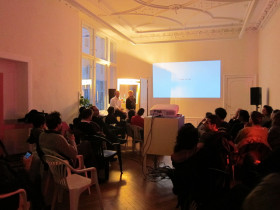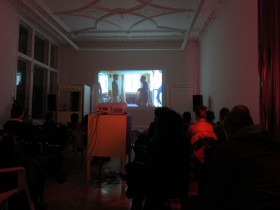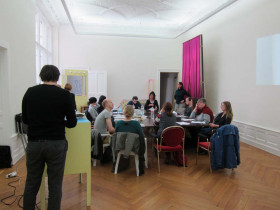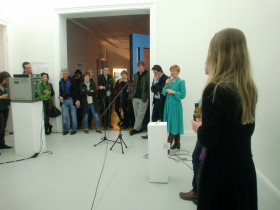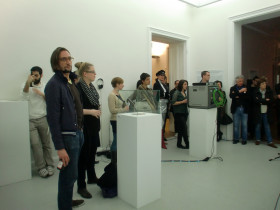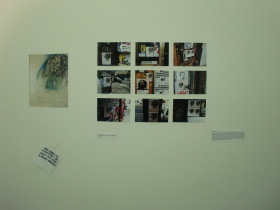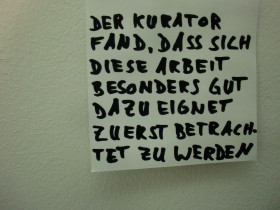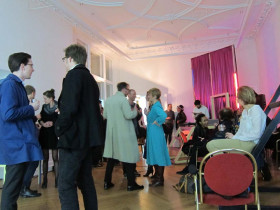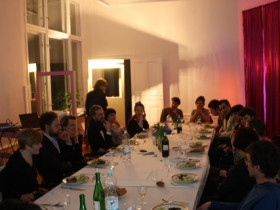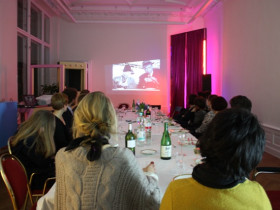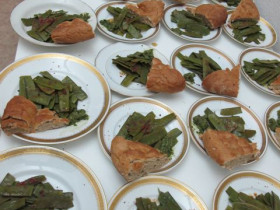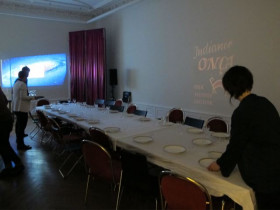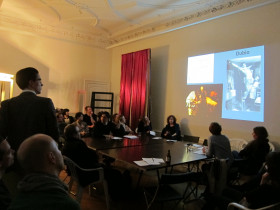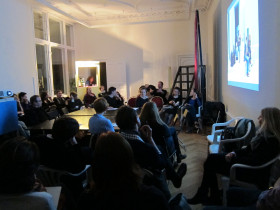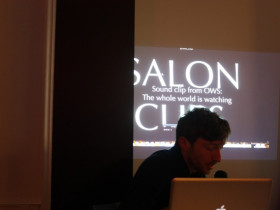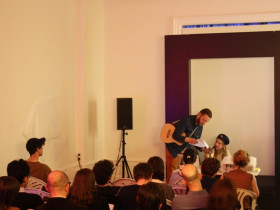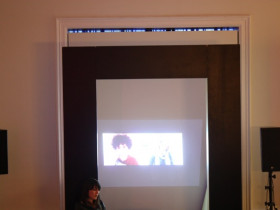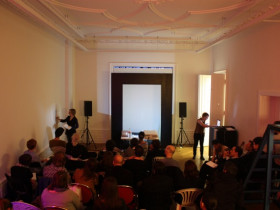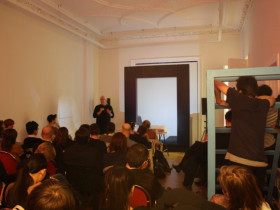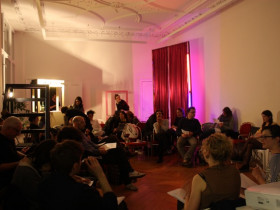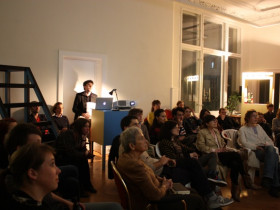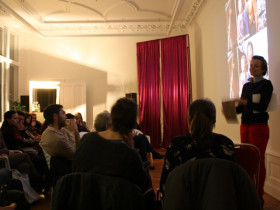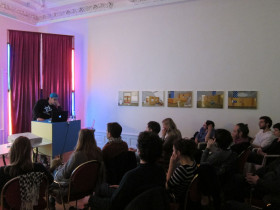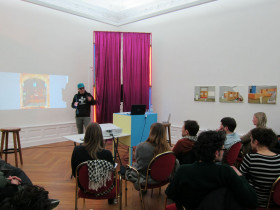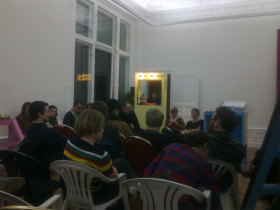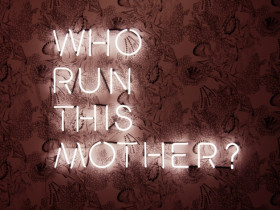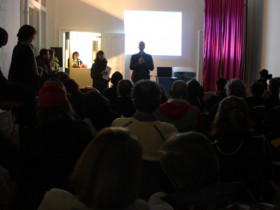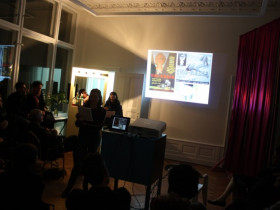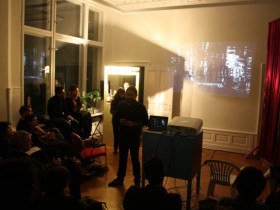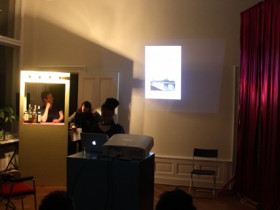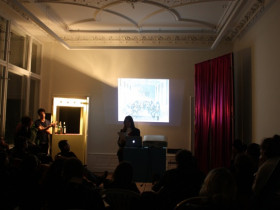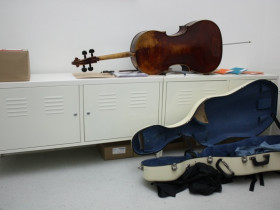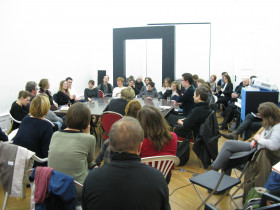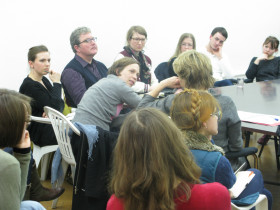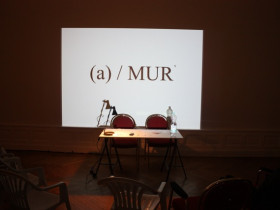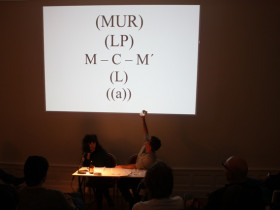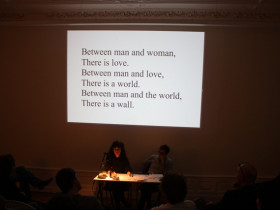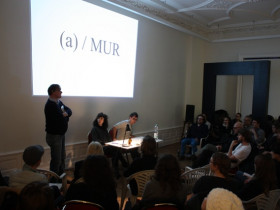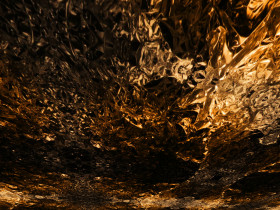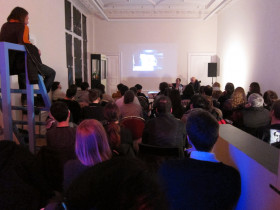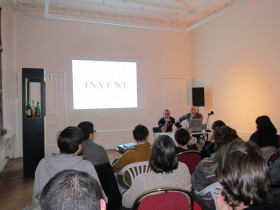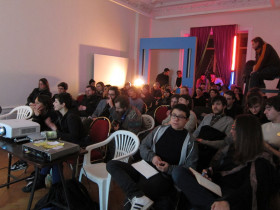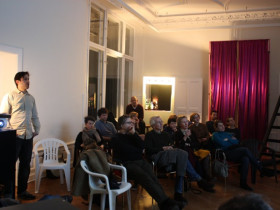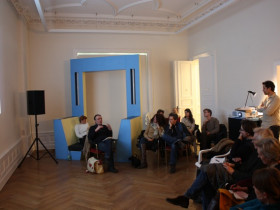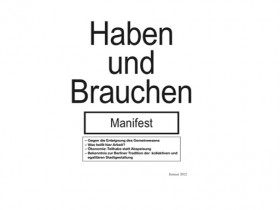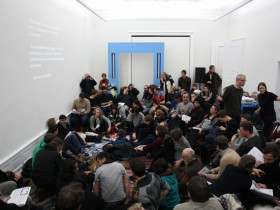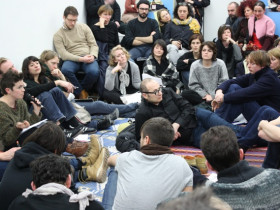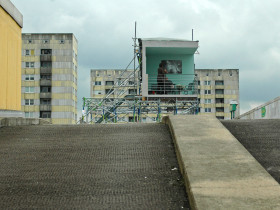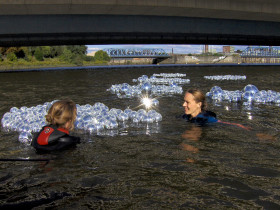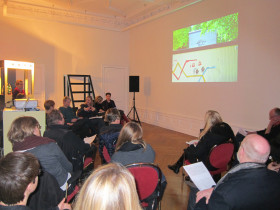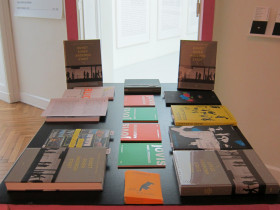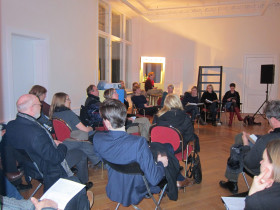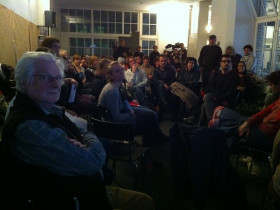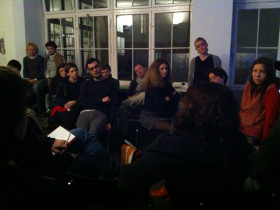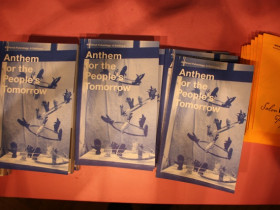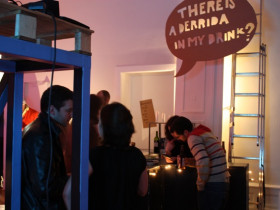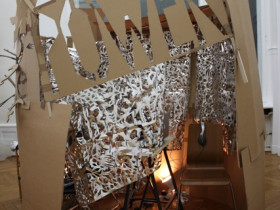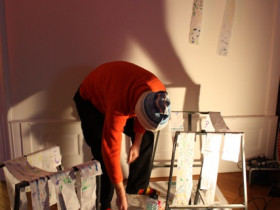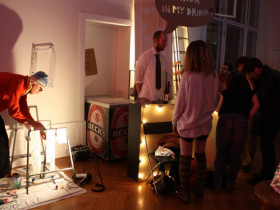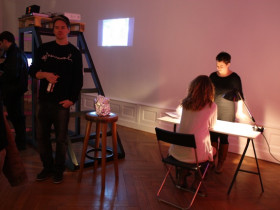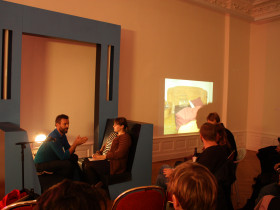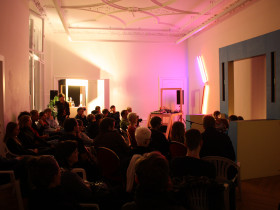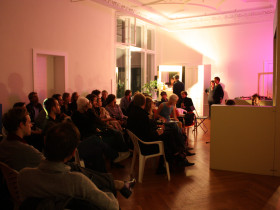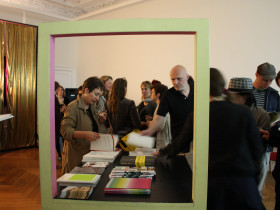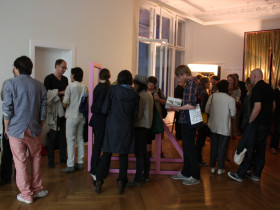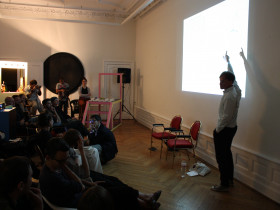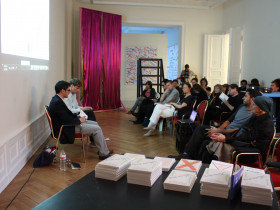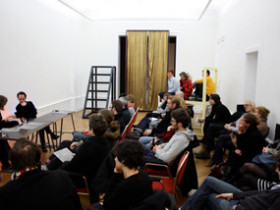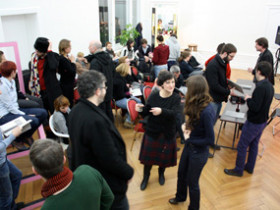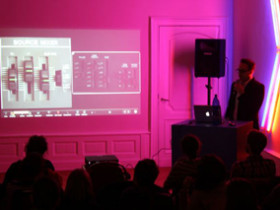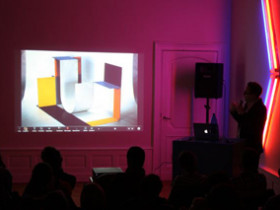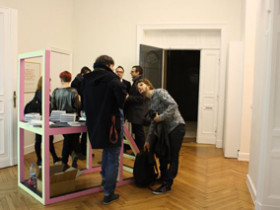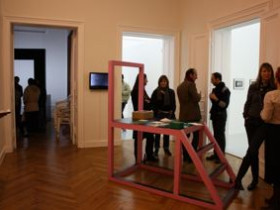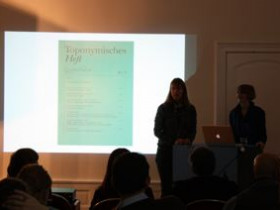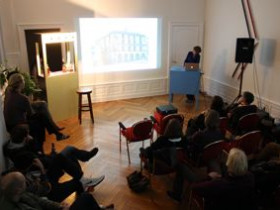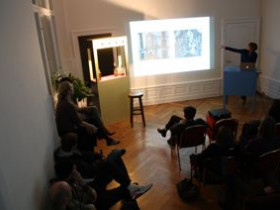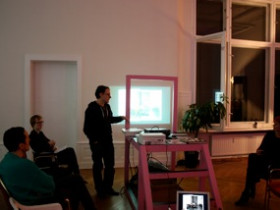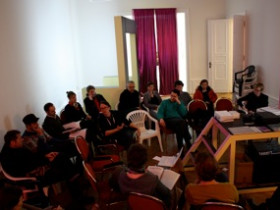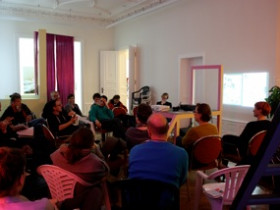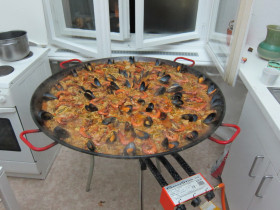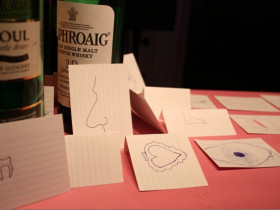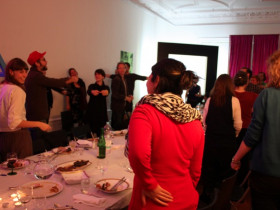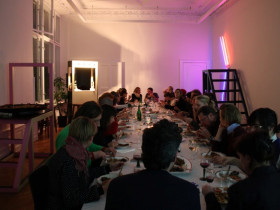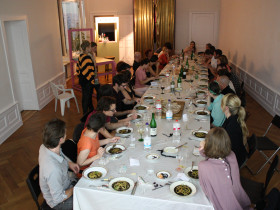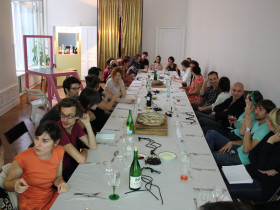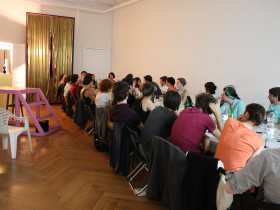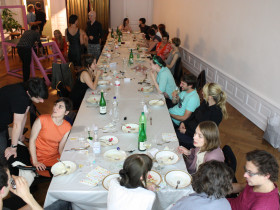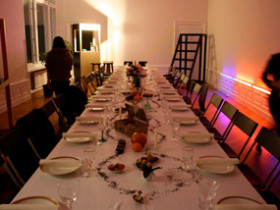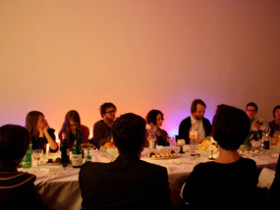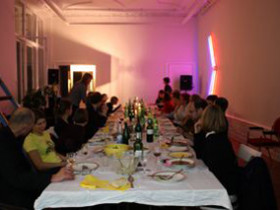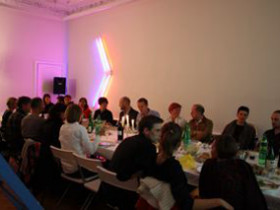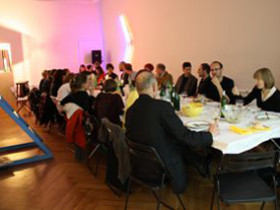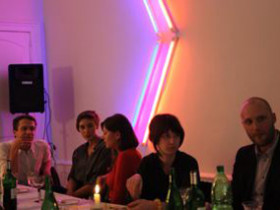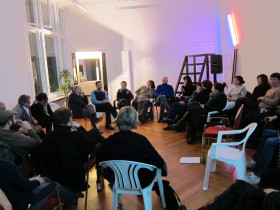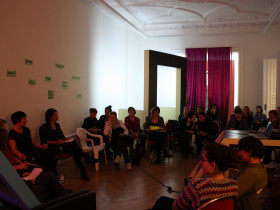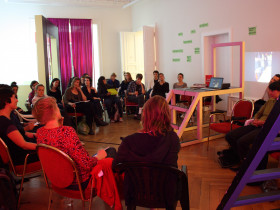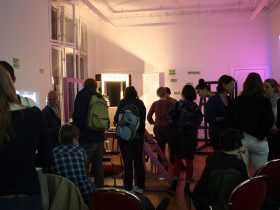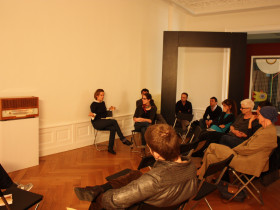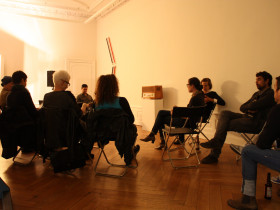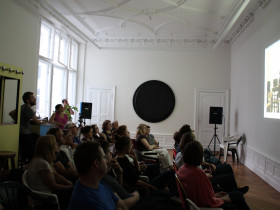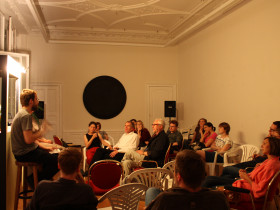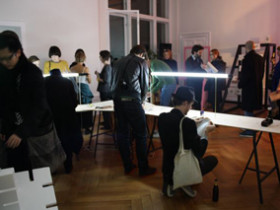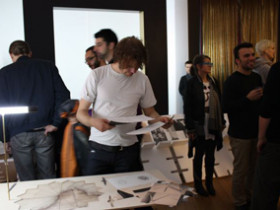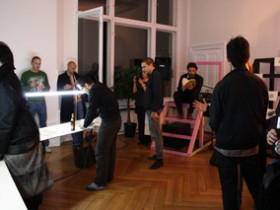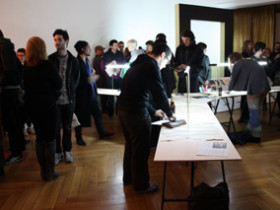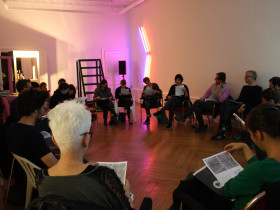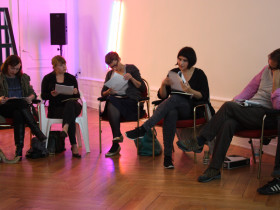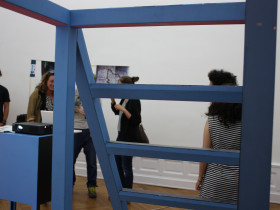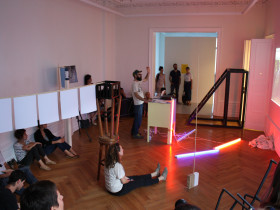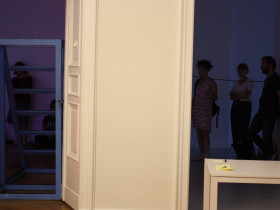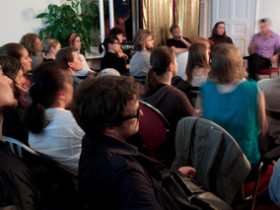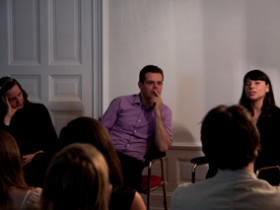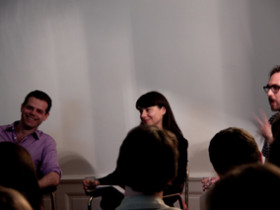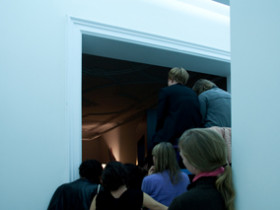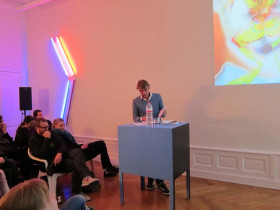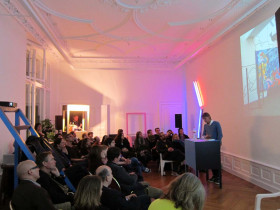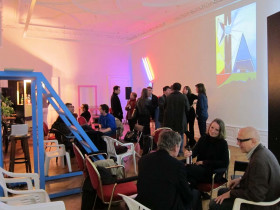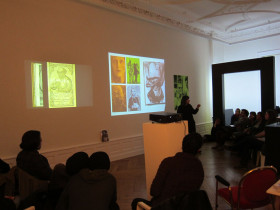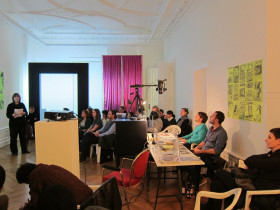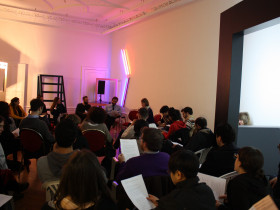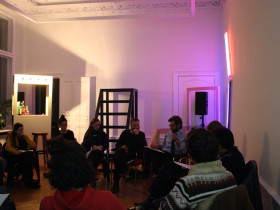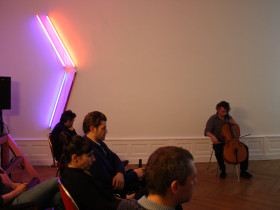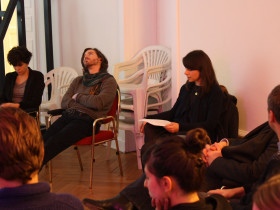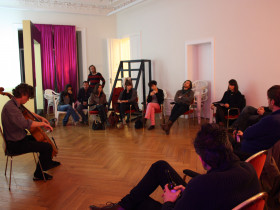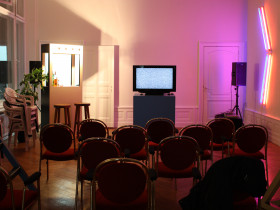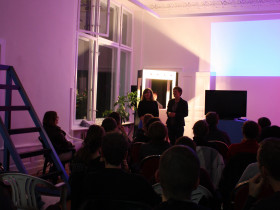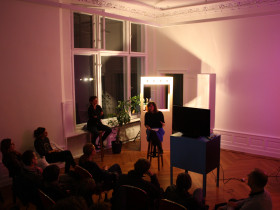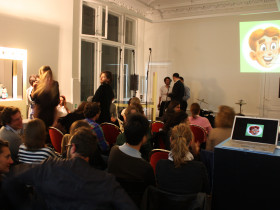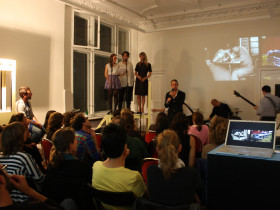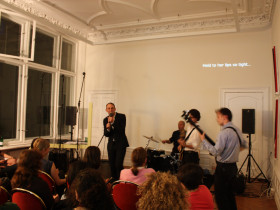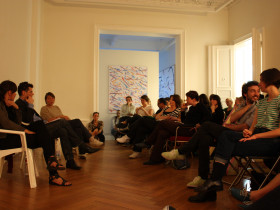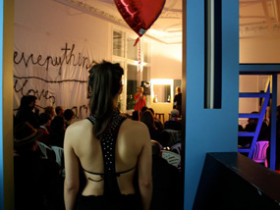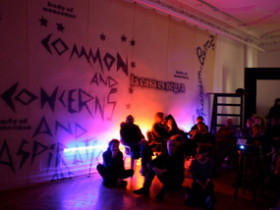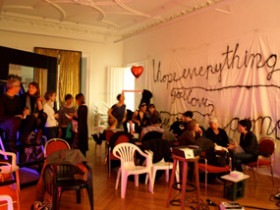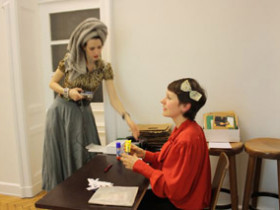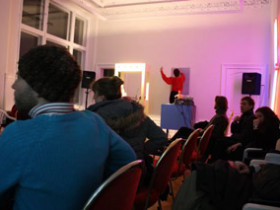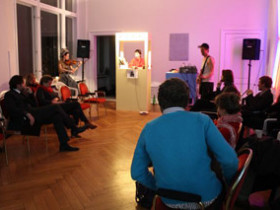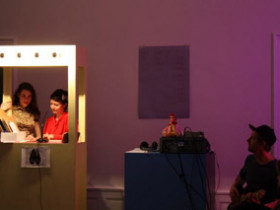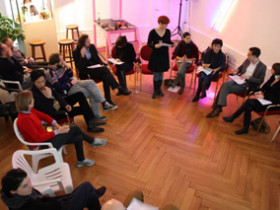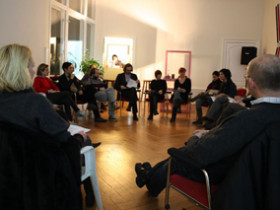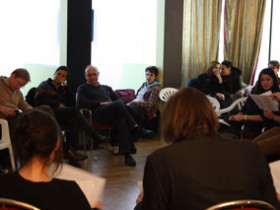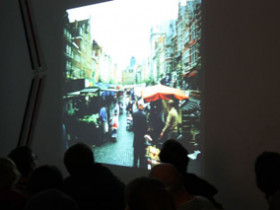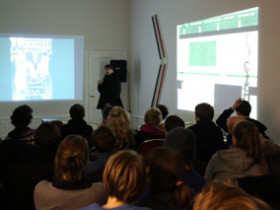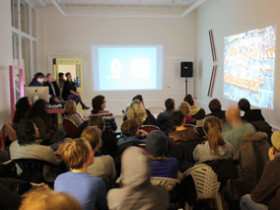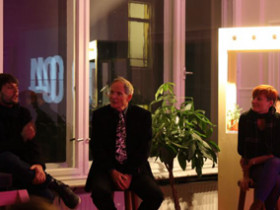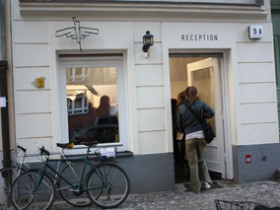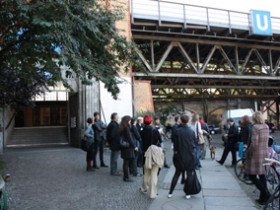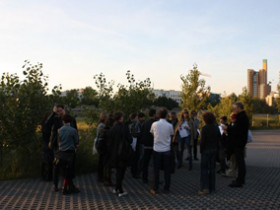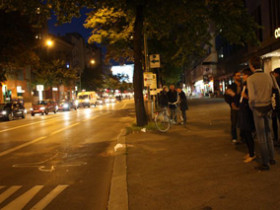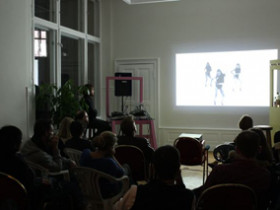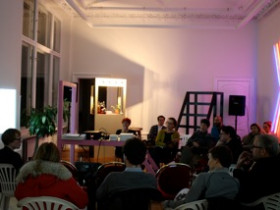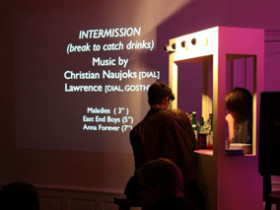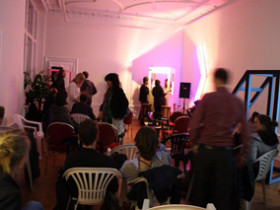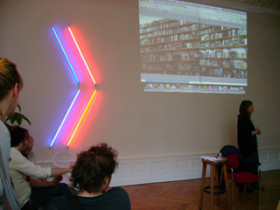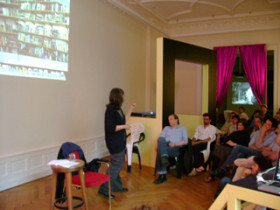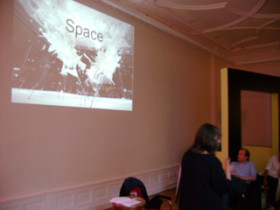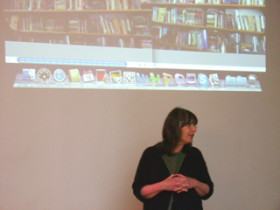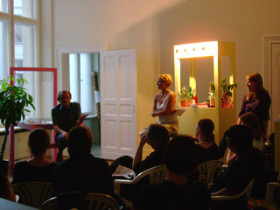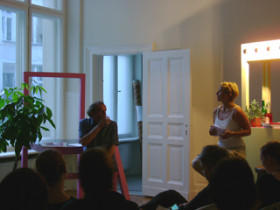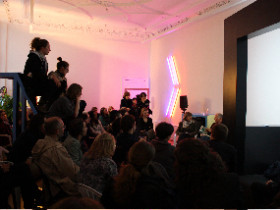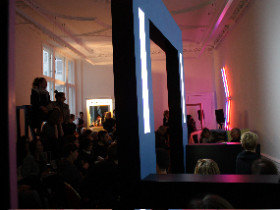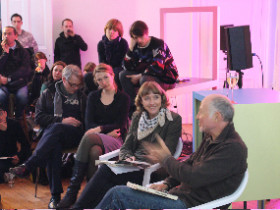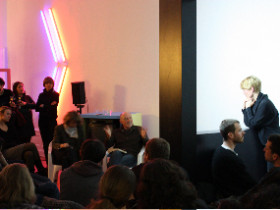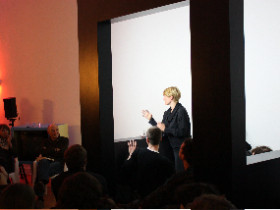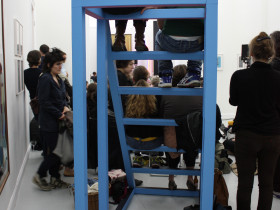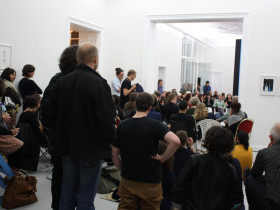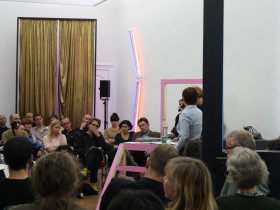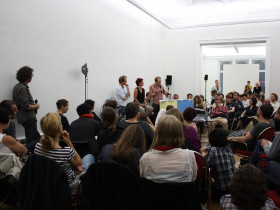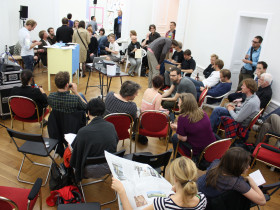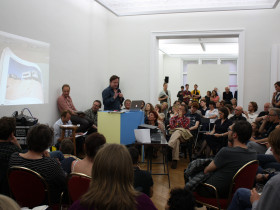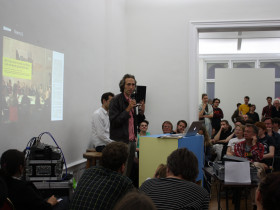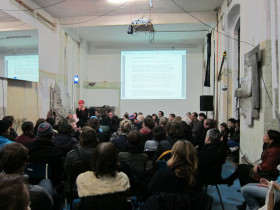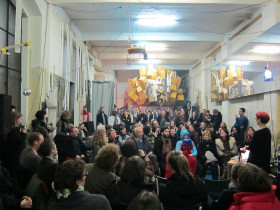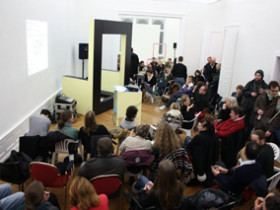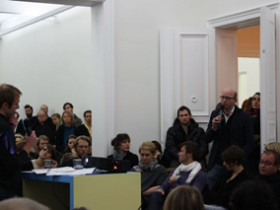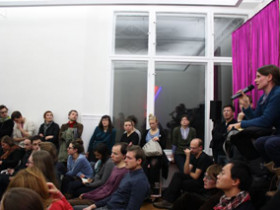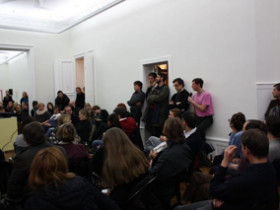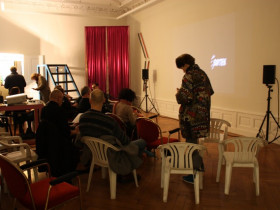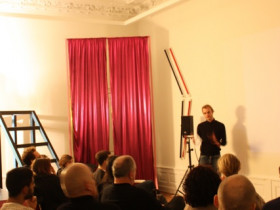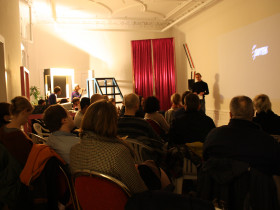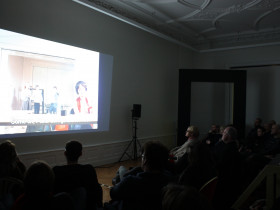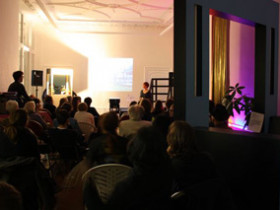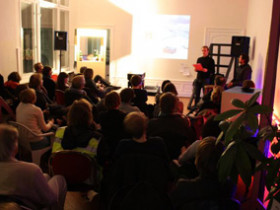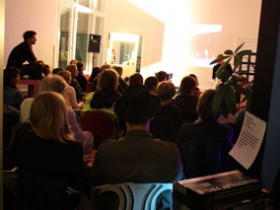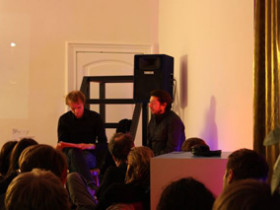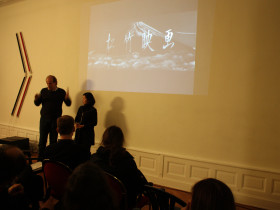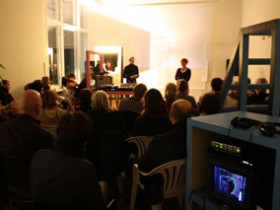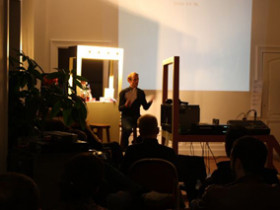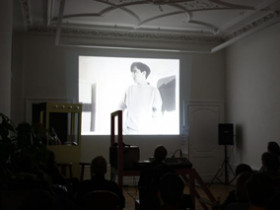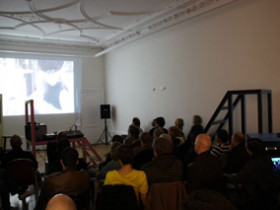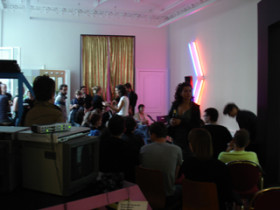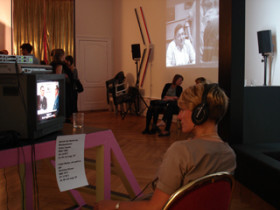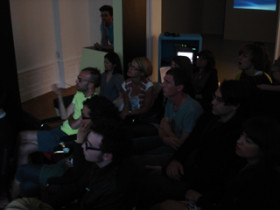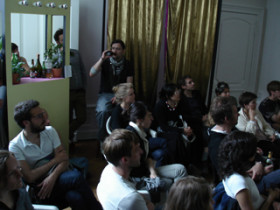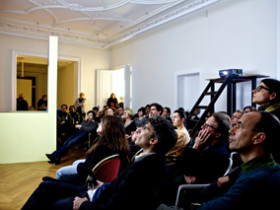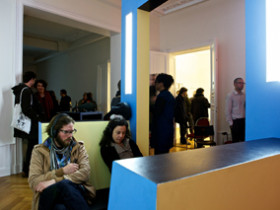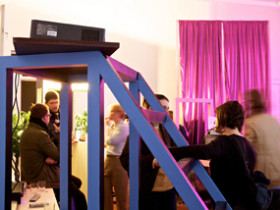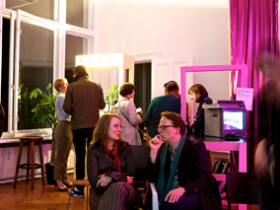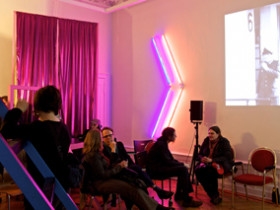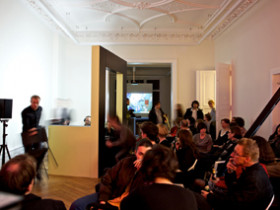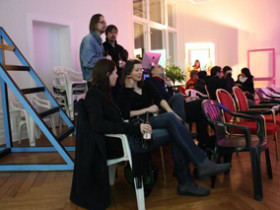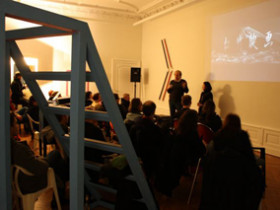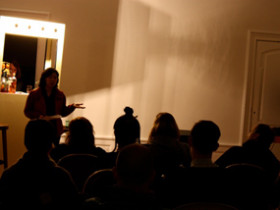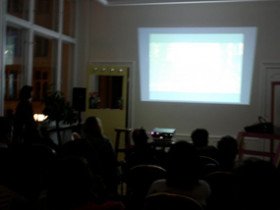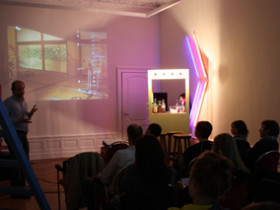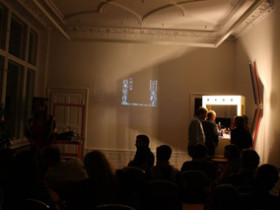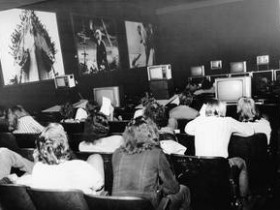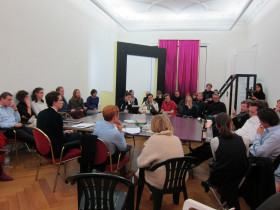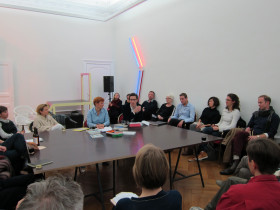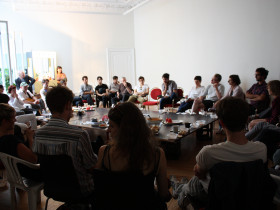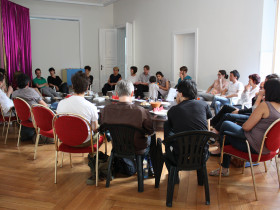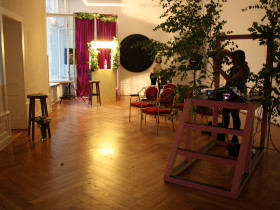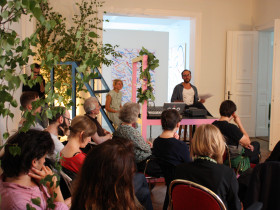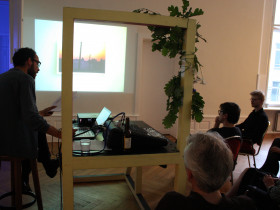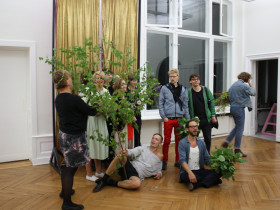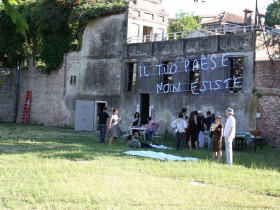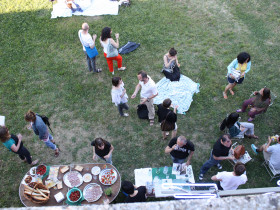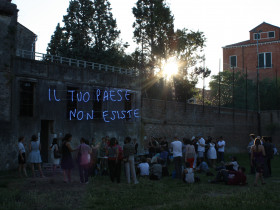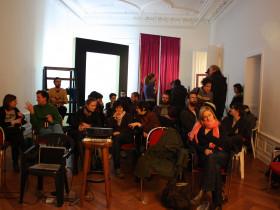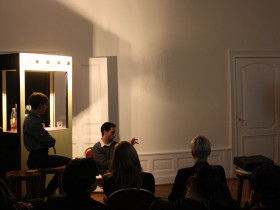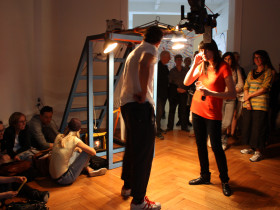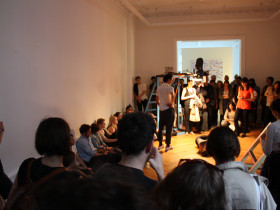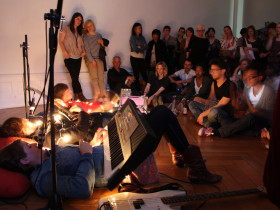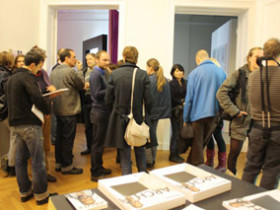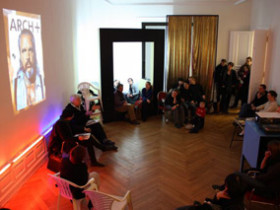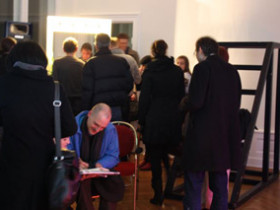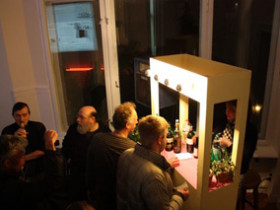Salon Populaire took up its activities in May 2010. Since then it hosts regular and irregular events with friends and colleagues from the art world…
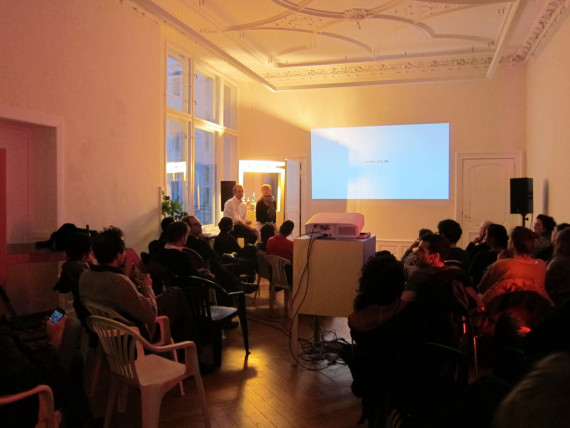
Film City Berlin Andrzej Zulawski’s Possession (1981)
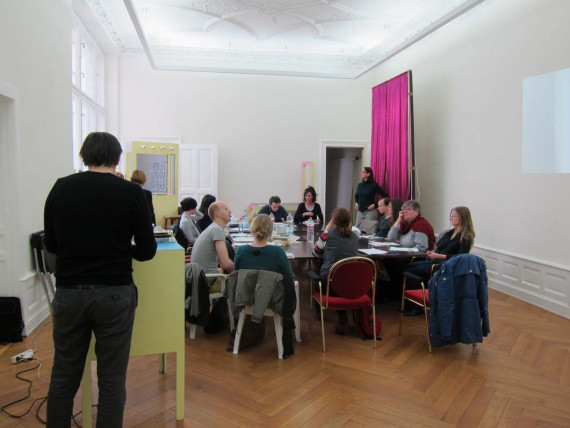
Film City Berlin A museum of cruelty
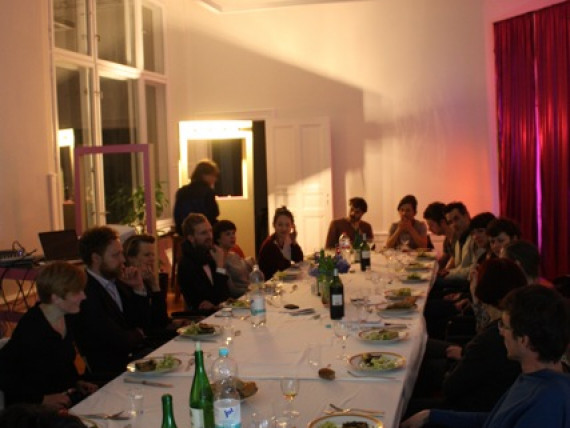
Film City Berlin Liability
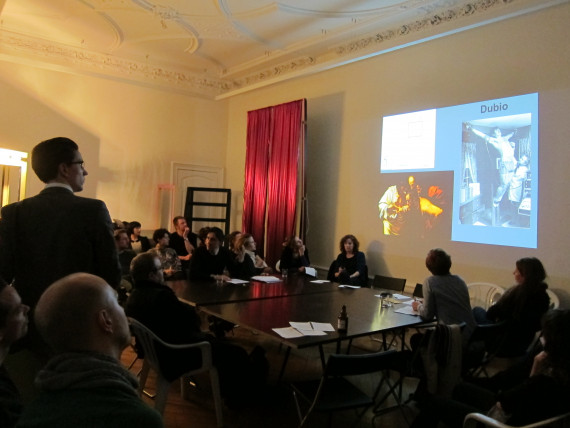
Film City Berlin (Self) Exhibiting. The Ethos of the Curator
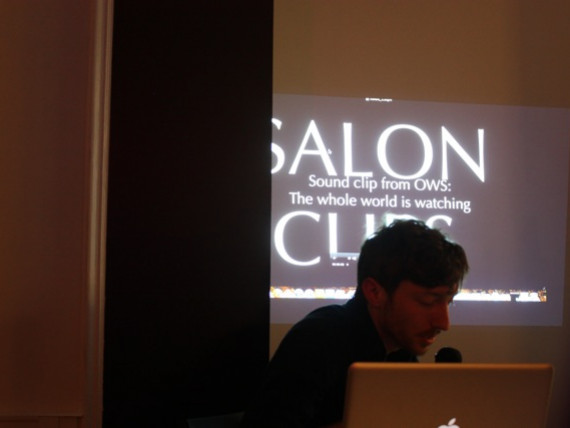
Film City Berlin Redefining Power
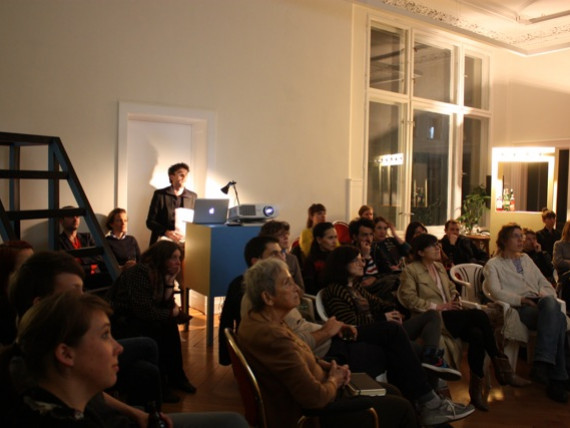
Film City Berlin The World According to Gert Jan Kocken
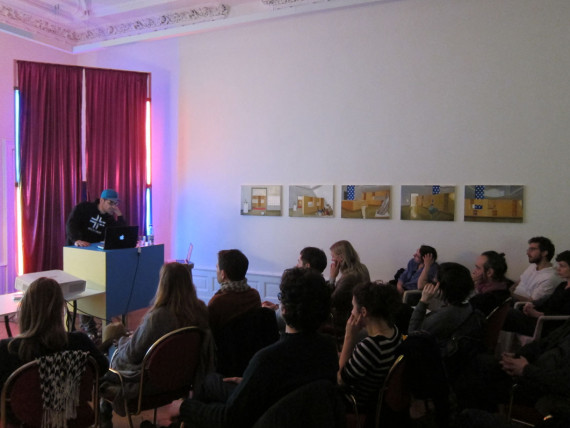
Film City Berlin Painting 1 Analysis and Convergences

Film City Berlin How closely do you identify with the character you play in facebook?
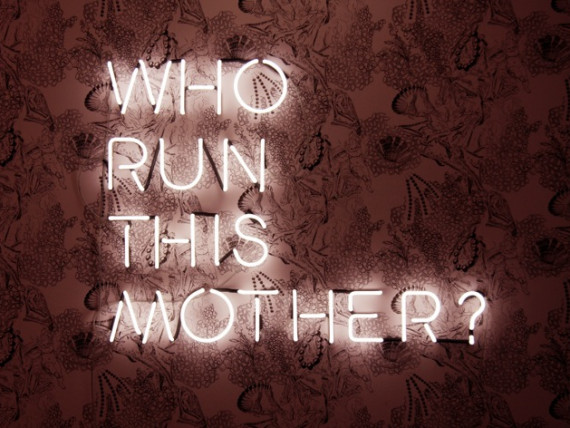
Film City Berlin “Whose English?” – frieze d/e Issue 4: Launch and Roundtable
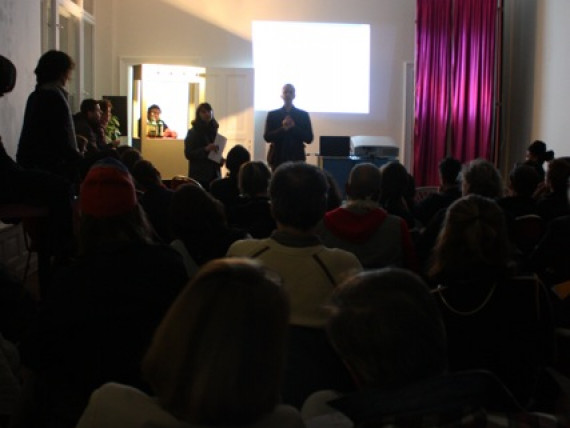
Film City Berlin Labor ∞ Transcendence
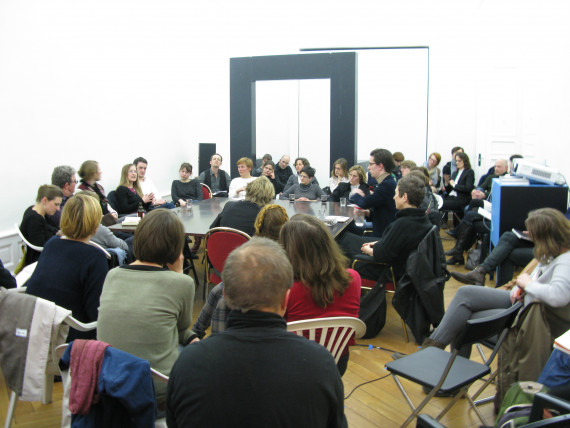
Film City Berlin Museum and Exhibition

Film City Berlin The Capitalist doesn’t Want to Know Anything about Things to do with Love
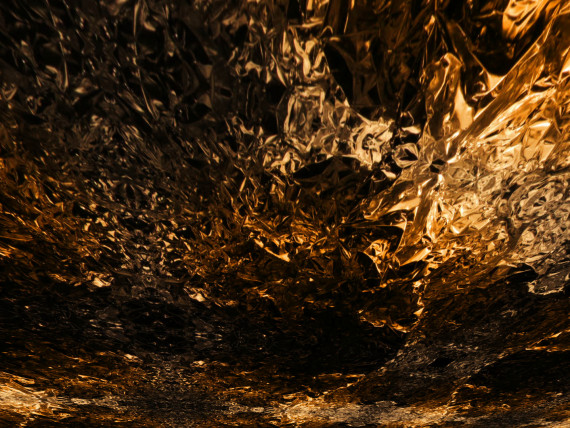
Film City Berlin Forum Expanded 2012: Critique and Clinic
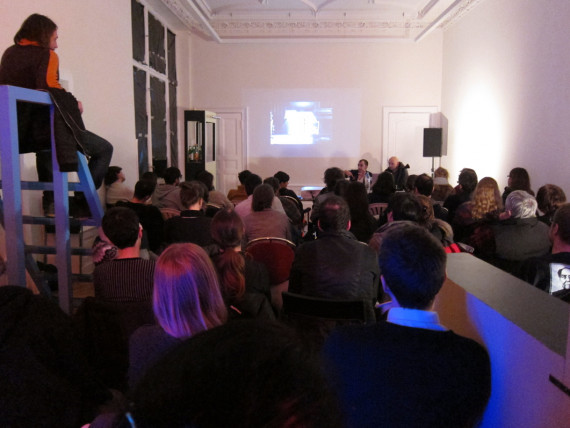
Film City Berlin Invent/Invest
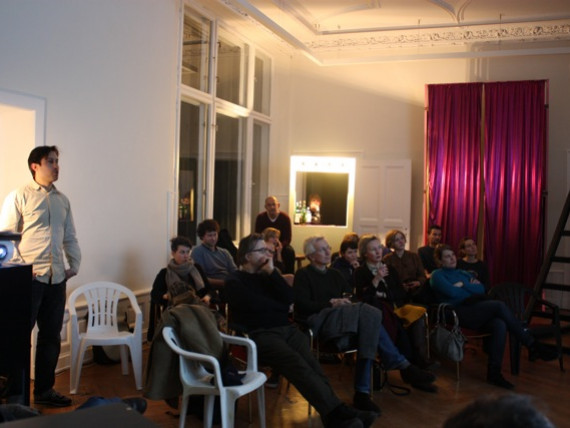
Film City Berlin Your Obedient Servant
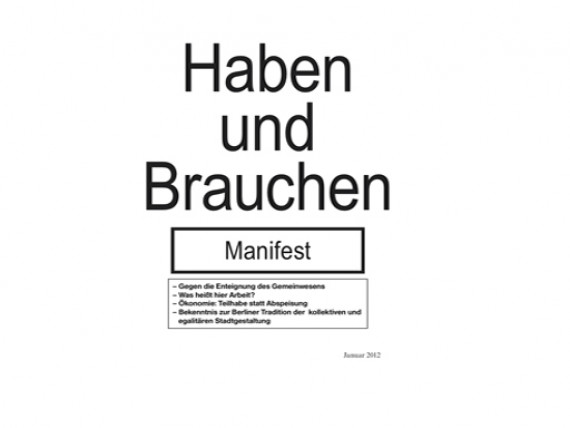
Film City Berlin Manifesto
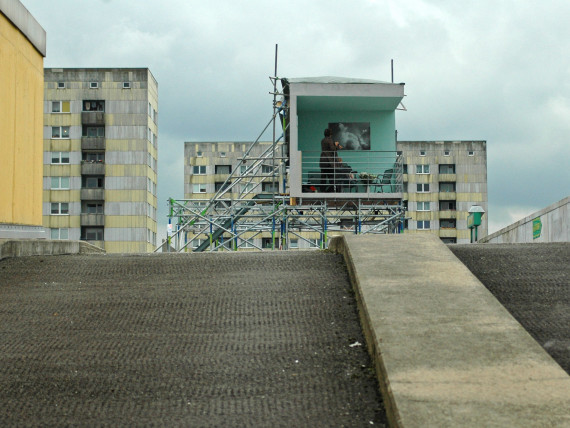
Film City Berlin Striking Constellations, or The Art of not Mediating (Art)
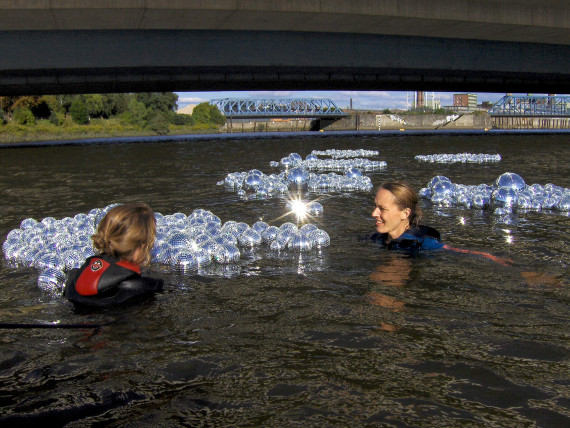
Film City Berlin Shifting the Index: Discussion on the Themes of the Publication “Kunst einer anderen Stadt”
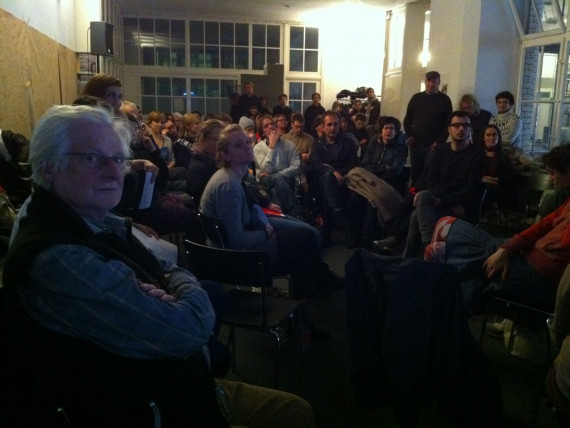
Film City Berlin To Have and To Need at the NGBK
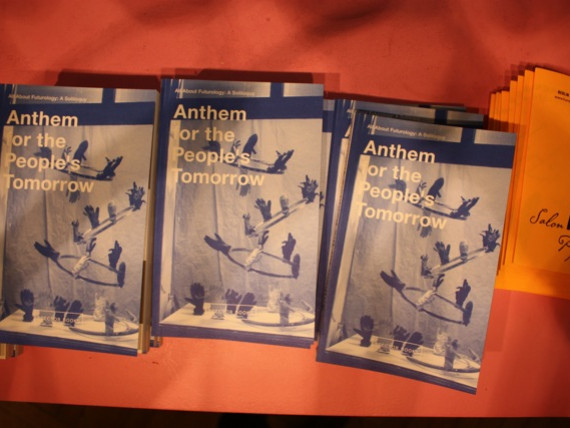
Film City Berlin Anthem for the People’s Tomorrow
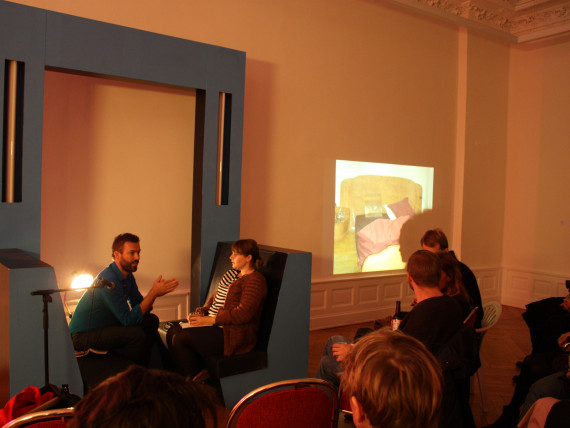
Film City Berlin Lost Once More. Writing in the Place of Painting?
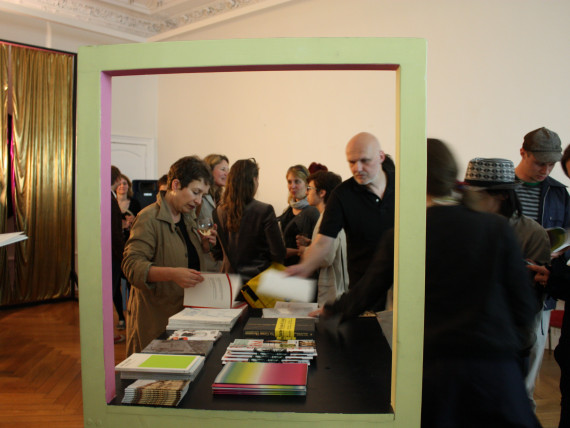
Film City Berlin New Releases by argobooks
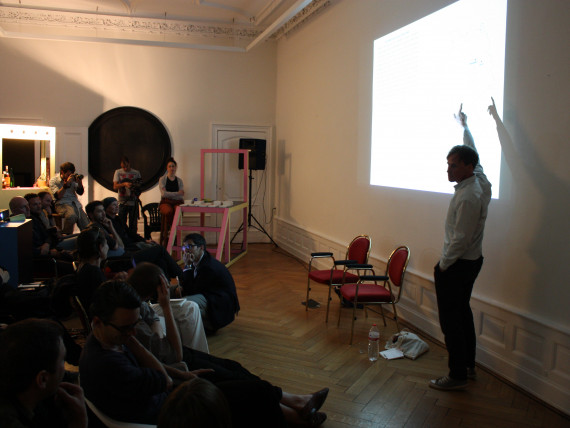
Film City Berlin Solutions 196-213: United States of Palestine-Israel
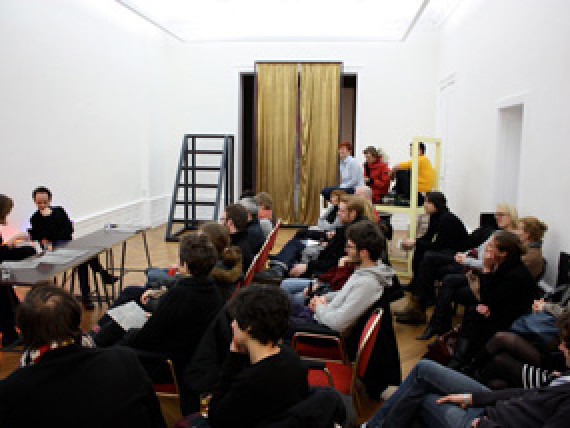
Film City Berlin Gabriel Kuri: Join the Dots and Make a Point
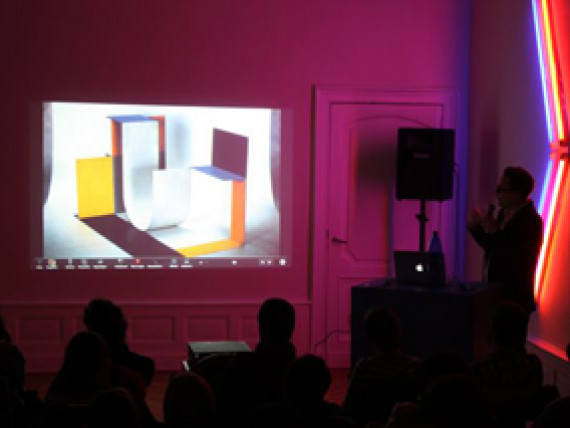
Film City Berlin Tell Me What You Want, What You Really, Really Want
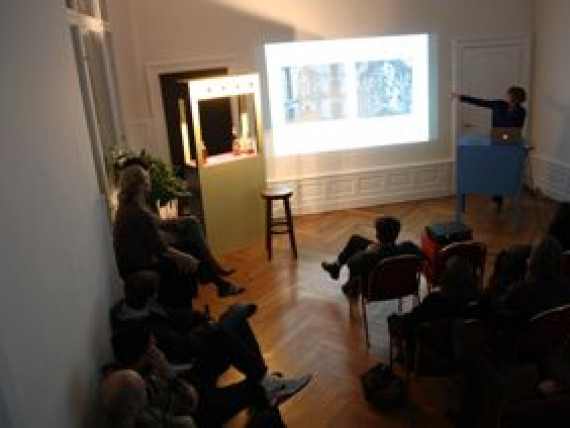
Film City Berlin The Trujillo-Syndrom
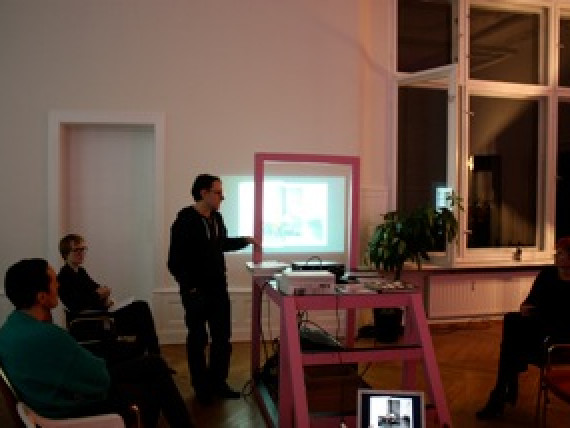
Film City Berlin Given: 1. The Book, 2. A Stage
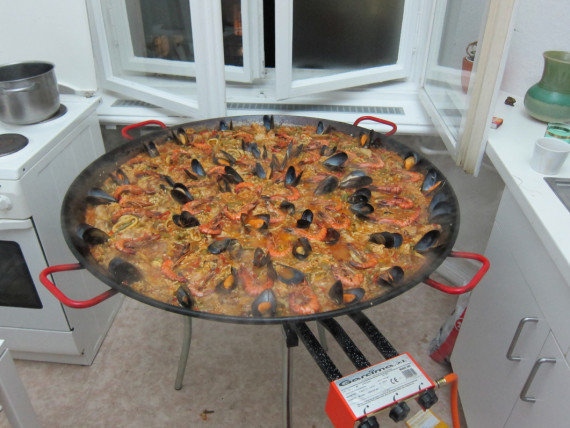
Film City Berlin Miracle
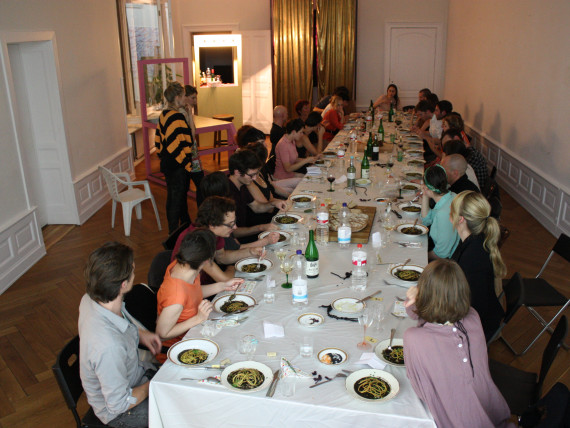
Film City Berlin Notion of the gift
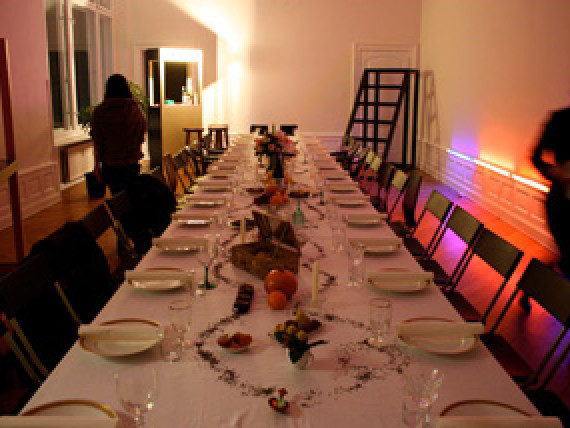
Film City Berlin Madness
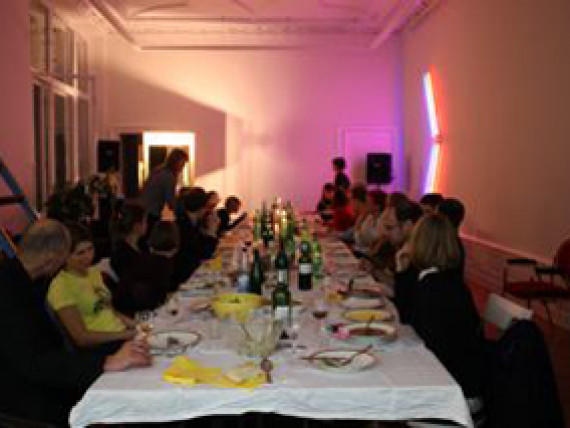
Film City Berlin Friendship
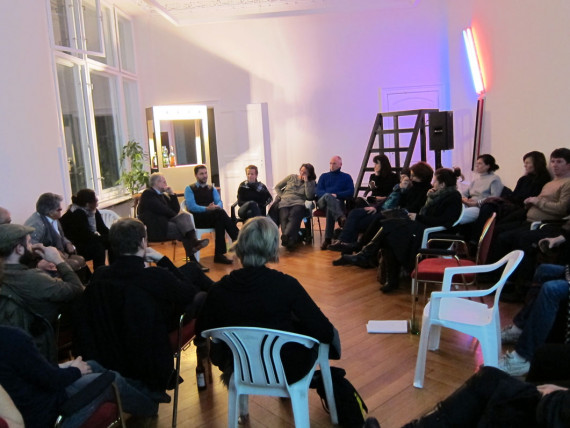
Film City Berlin Luis Camnitzer: The Assignment Book
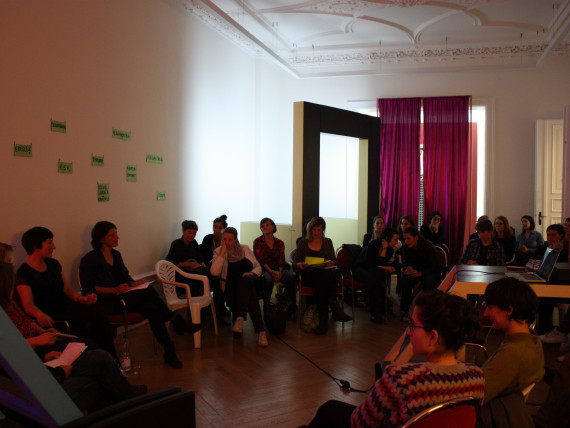
Film City Berlin Goldrausch Künstlerinnenprojekt. Goldrausch as a system.
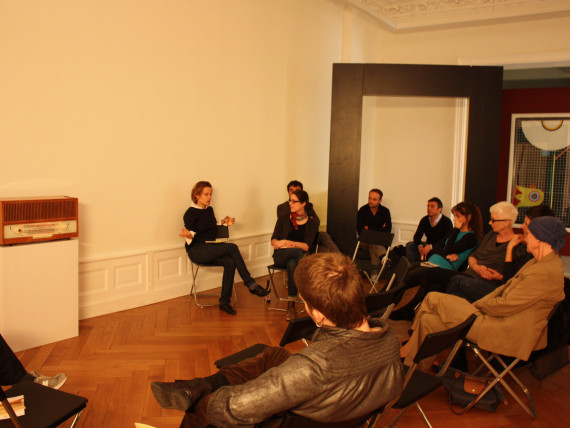
Film City Berlin Michael Müller: Weltempfänger Ich-Oper
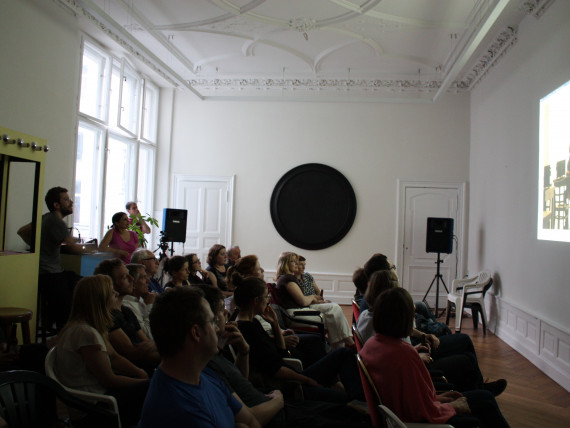
Film City Berlin Paul Plamper: TACET (RUHE 2)
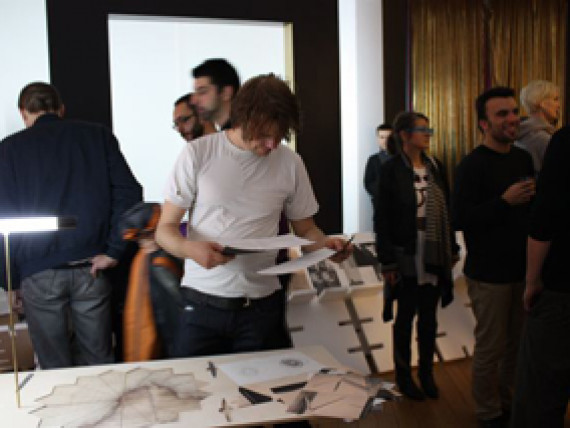
Film City Berlin The Anxious Prop, Case 3: The Black Swan Issue
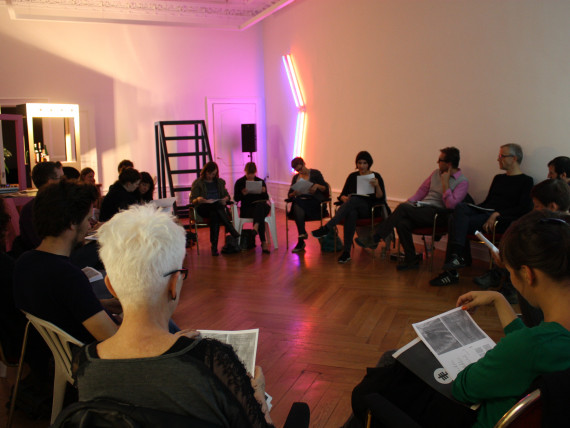
Film City Berlin Katya Sander: Die kleine Berlin Statistik.
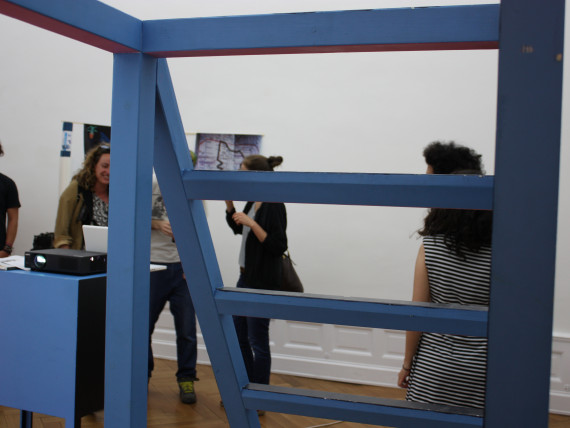
Film City Berlin Phanos Kyriacou: Everyone should walk.
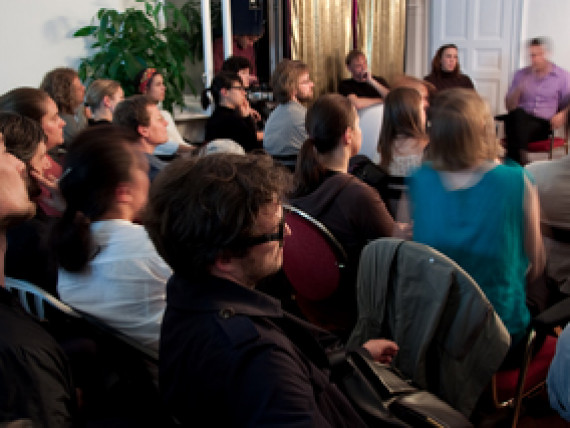
Film City Berlin Renzo Martens: Enjoy Poverty.
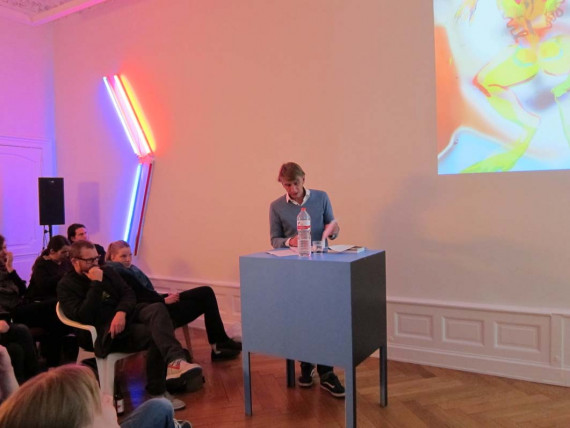
Film City Berlin Gunter Reski
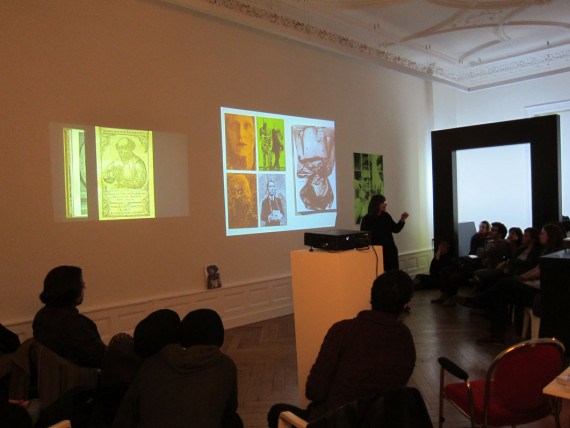
Film City Berlin Frankenstein, Mensch Maschine
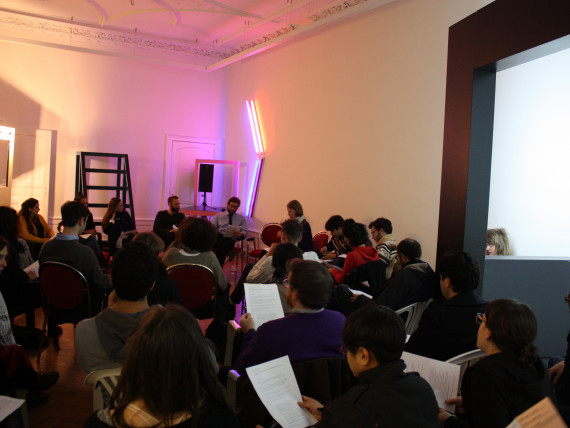
Film City Berlin Heidegger on Disposition and Mood: the Case of Geometry
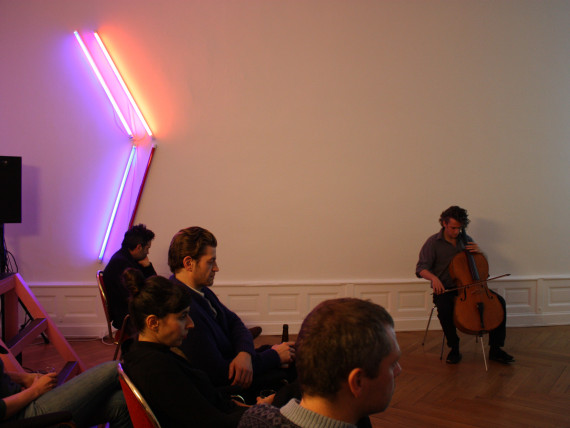
Film City Berlin The Story of the Wolf Tone
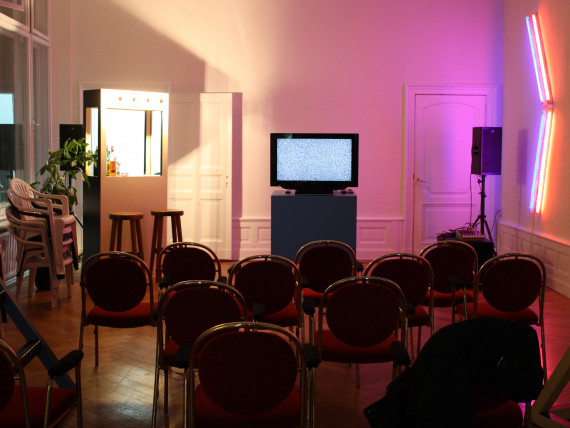
Film City Berlin If You Were There – Lindsay Anderson’s 1985 Film of Wham! In China
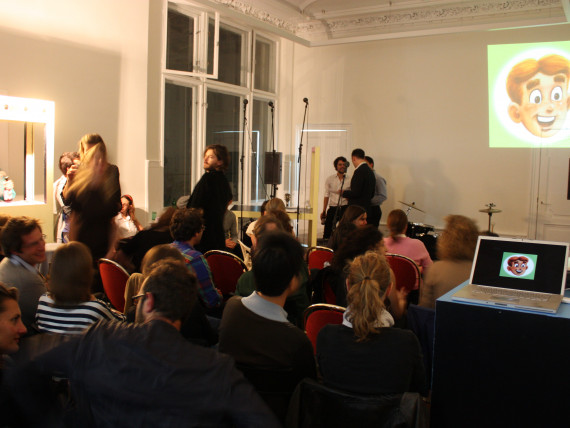
Film City Berlin From the Department of Bad Moods 3: Teenage coffin Songs
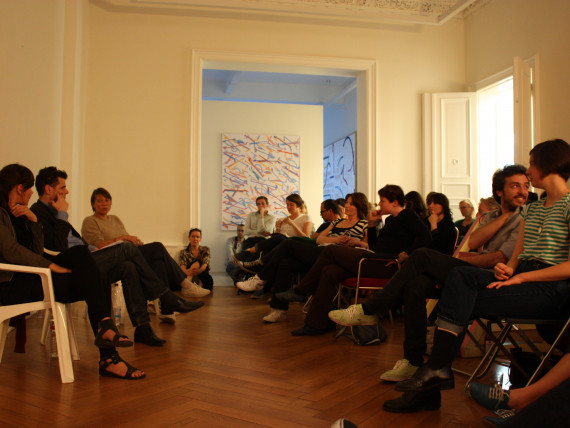
Film City Berlin Carry On

Film City Berlin Once Again: With all our Love for the Love of Orlando
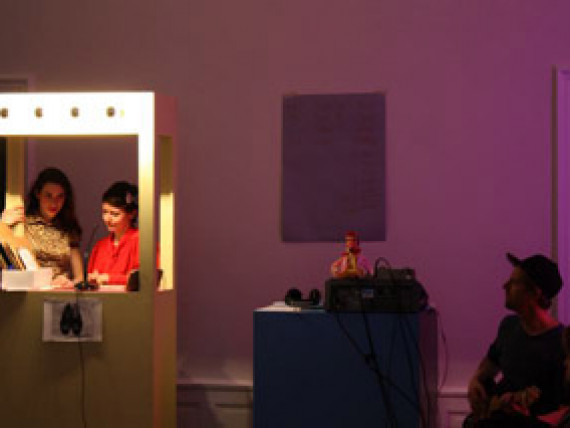
Film City Berlin Money in Friends
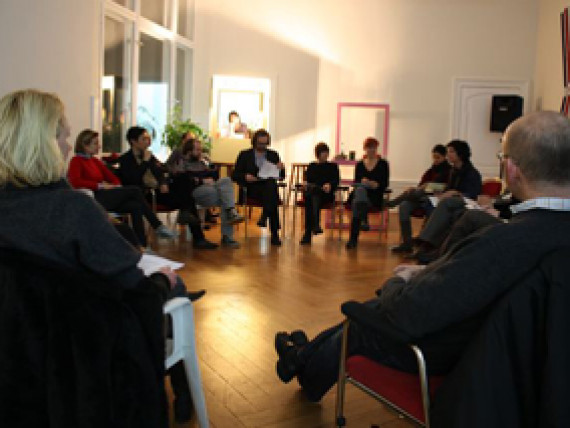
Film City Berlin Athens Night
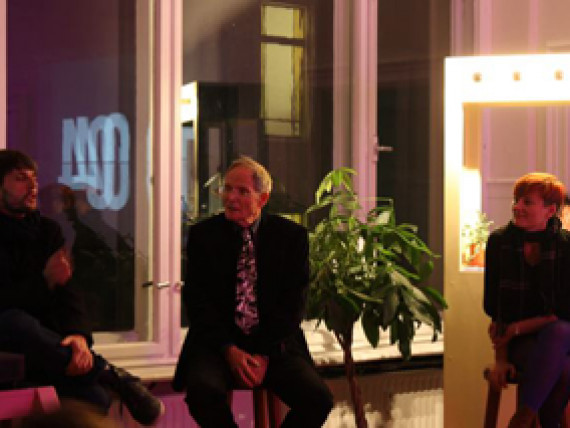
Film City Berlin Stadtplätze, Stadtleben? oder Vermeiden von Menschendingsbums (2 Vorträge)
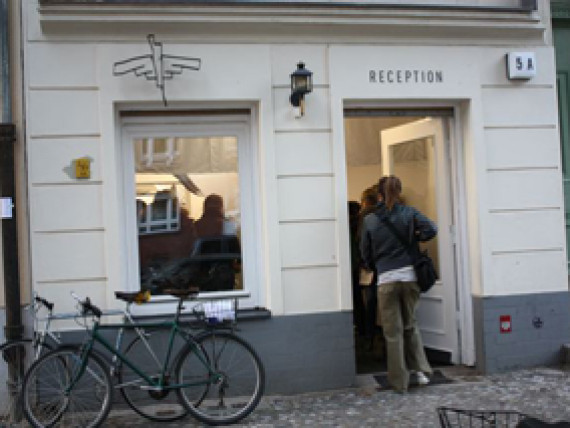
Film City Berlin Seams and Notches
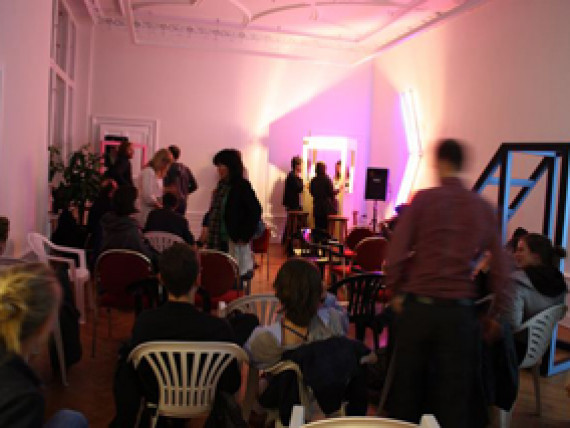
Film City Berlin Love and Space
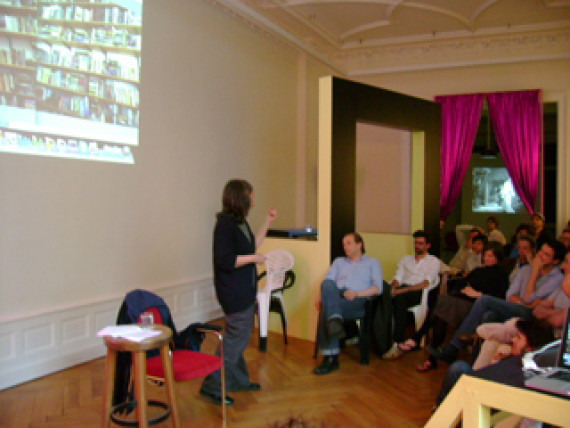
Film City Berlin Use and abuse of Science Fiction: An Introduction
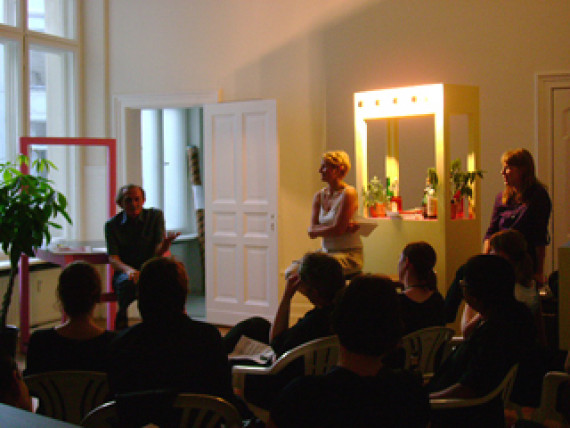
Film City Berlin Praise of Laziness
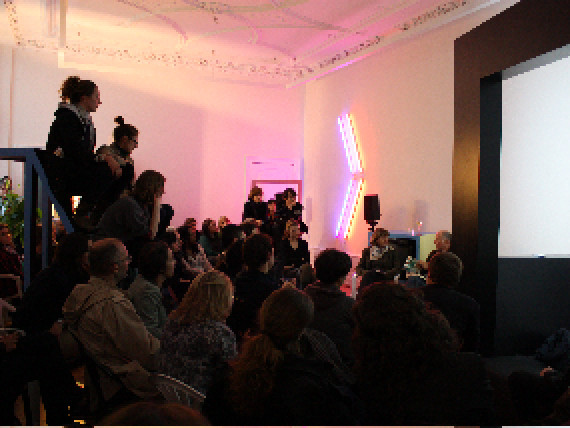
Film City Berlin The German Issue – An evening dedicated to the Berlin Wall
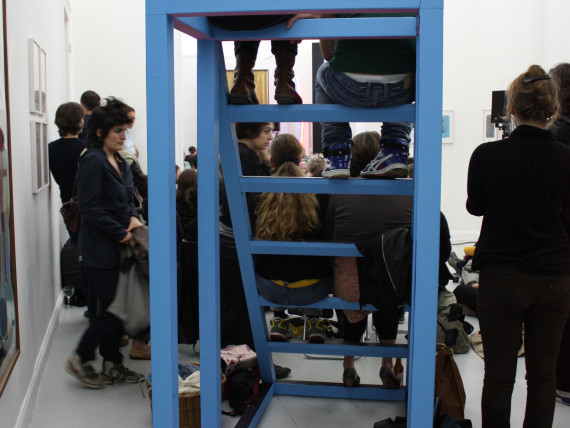
Film City Berlin Responsibilities of Institutions and Individuals
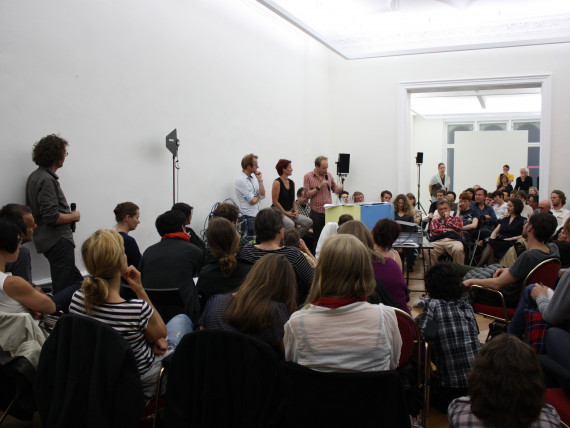
Film City Berlin Art and City planning
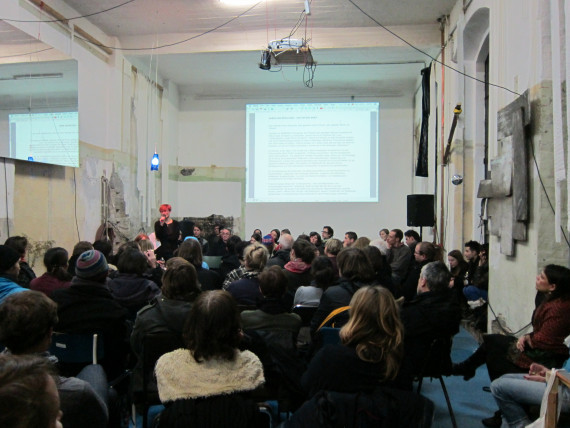
Film City Berlin Writing Collectively an Open Letter
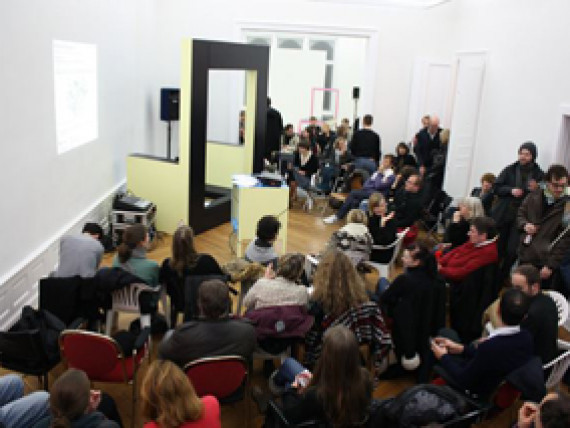
Film City Berlin On the “Leistungsschau” project
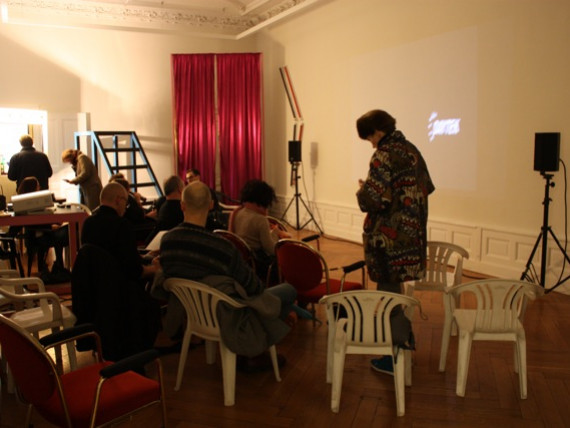
Film City Berlin R.W. Fassbinder’s “The Third Generation” (1979)
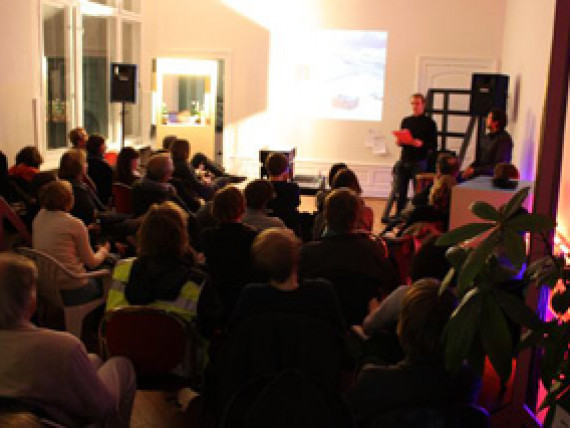
Film City Berlin Pochmann
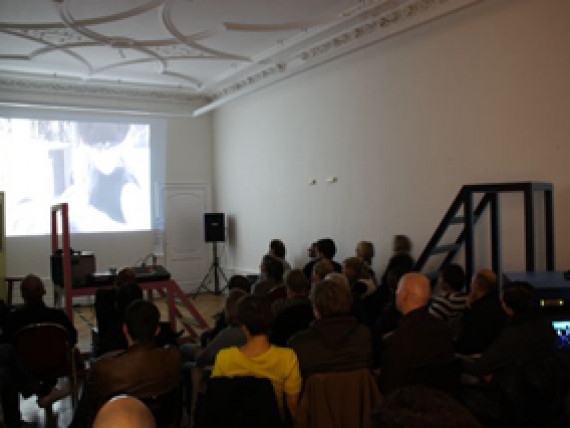
Film City Berlin Burning Concrete
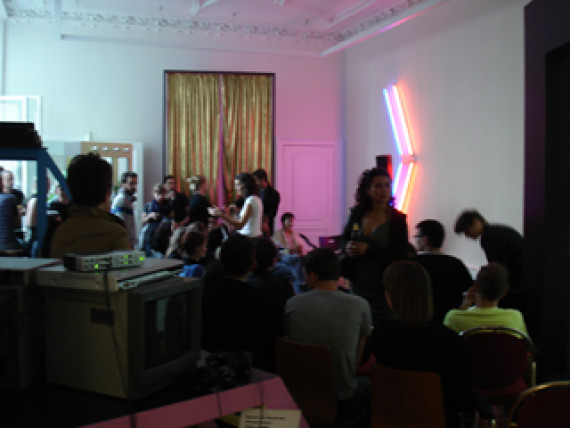
Film City Berlin Escape Forward
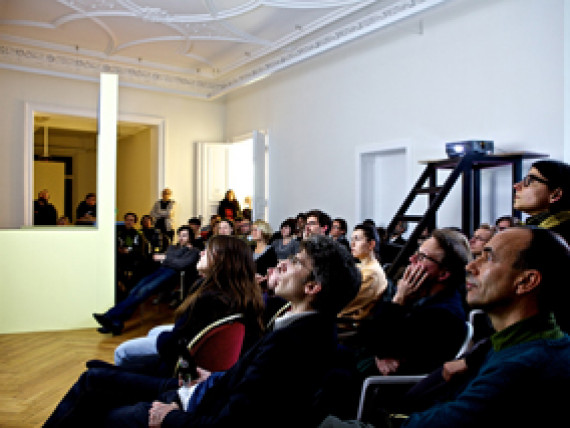
Film City Berlin Behind the Codes
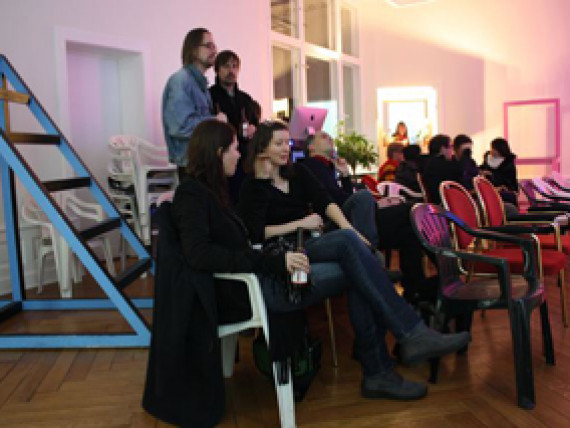
Film City Berlin Omen in the Mirror
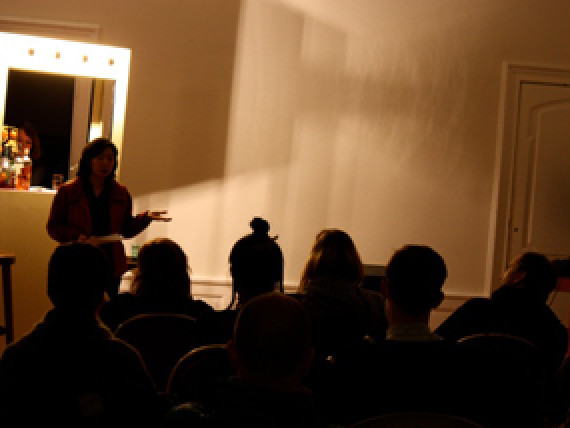
Film City Berlin Eros and Massacre
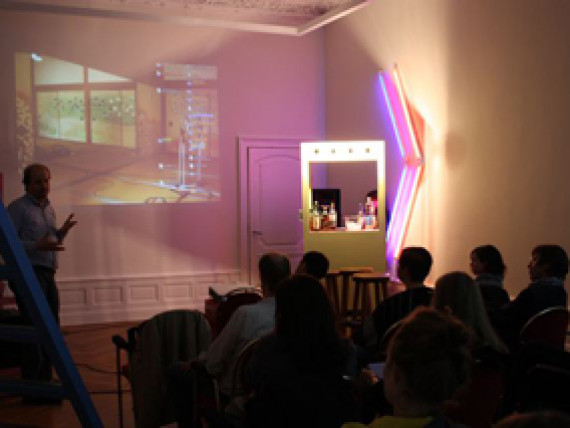
Film City Berlin Akitsu Springs
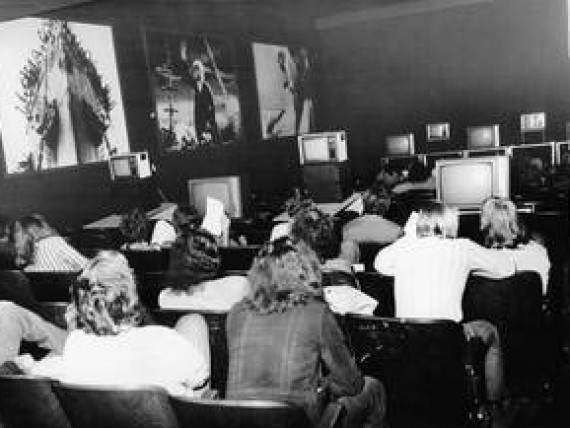
Film City Berlin The Living Archive
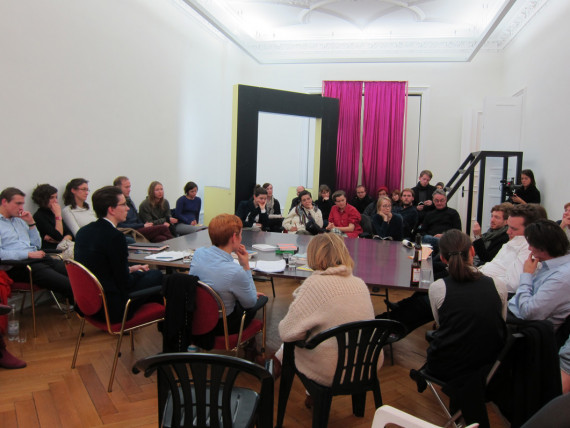
Film City Berlin Introduction
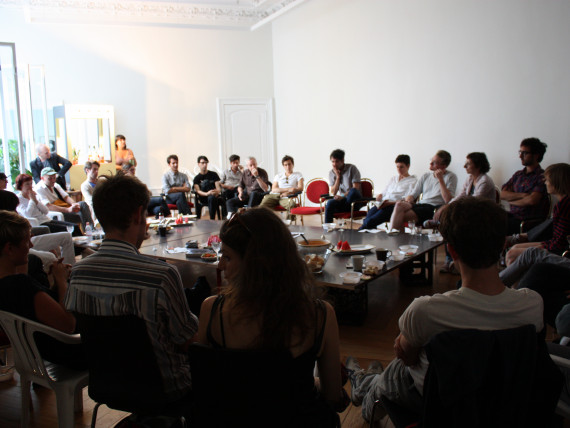
Film City Berlin If it happens, it happens. If it doesn’t, it doesn’t
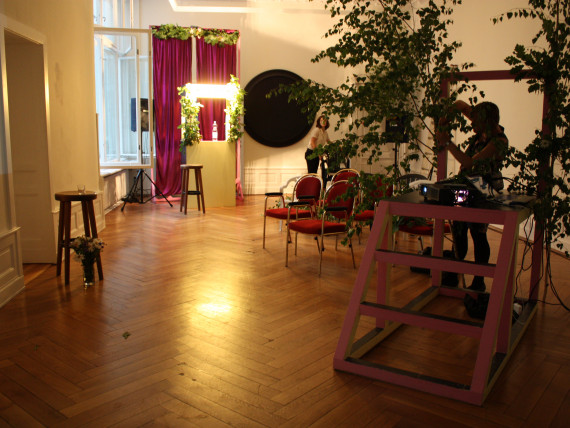
Film City Berlin The Bucolic Genre today: Between a Subtrend of Organic Lifestyle and Provincial Art. (C as host)
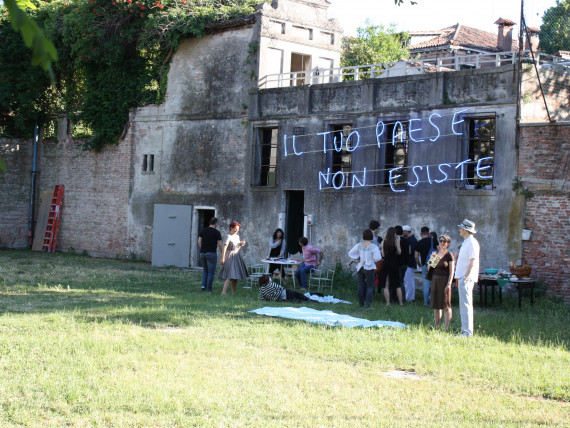
Film City Berlin Salon Populaire and THE OFFICE in Venice
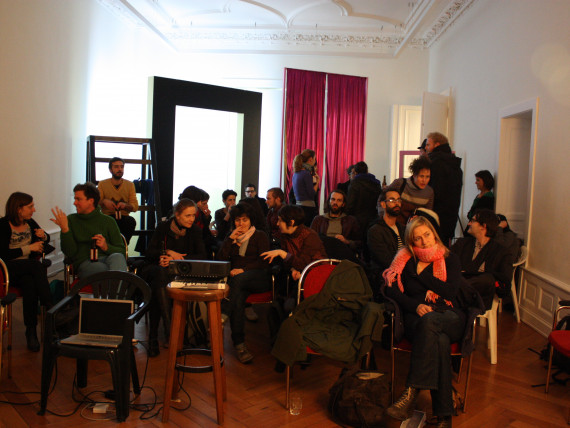
Film City Berlin Assaf Gruber
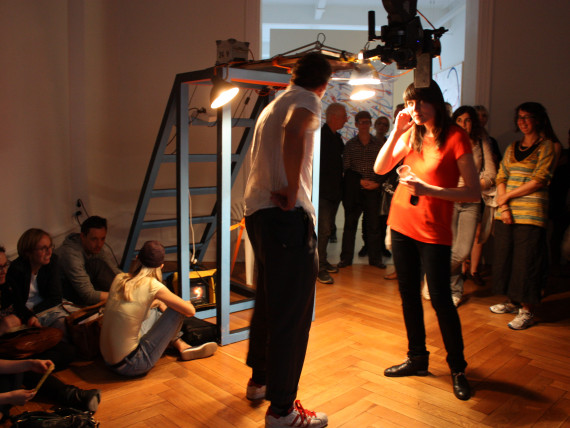
Film City Berlin Alicia Frankovich
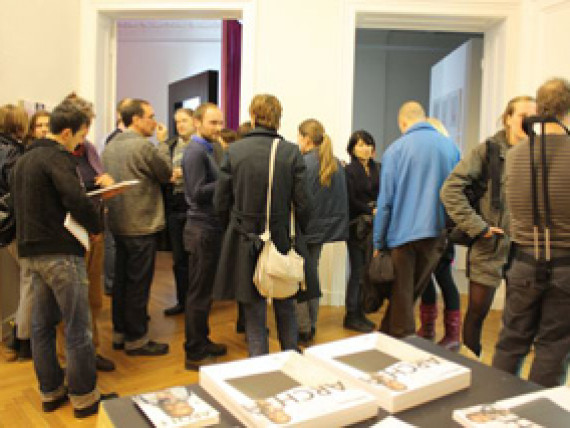
Film City Berlin Michael Dreyer / Clemens Krümmel and Nicolaus Grunert / Anh-Linh Ngo (ARCH+)
Kategorien Archives Archive
#0 – The Bet 11.07.2013 at 7 pm
an evening of talks and performances for the contemporary attention span.
Presented by Ana Teixeira Pinto, in association with KW and Foreign Affairs‘ collaboration on the subject of the Bet.
Kunst-Werke Chora (3rd floor, main building), 3 Euros.
#-1 – Exhibiting and the Exhibition
Ellen Blumenstein and Felix Vogel host a conversation with Ralf Beil, Director of Mathildenhöhe Institute, Darmstadt. 04.06.2013 at 7 pm
Kunst-Werke Studiolo (front house, first floor), 3 Euros.
#-2 – Spacial Translation 19.04.2012 at 8 pm
With Samuel Korn
Continue reading
#-3 – Andrzej Zulawski’s Possession (1981) 18.04.2012 at 8 pm
A Film Club Screening and Conversation on Fantasy, Separation and Urban Planning. Hosted by Florian Wüst. Continue reading
#-4 – A museum of cruelty 11.04.2012 at 8 pm
Das Museum der Grausamkeit. Ein Ausstellungsmanifest
1. Ausstellungen sollten Medien kultureller Selbstverständigung sein.
Exhibitions should be the medium of cultural self-understanding.
2. Die Institution muss die Auseinandersetzung mit den Gesetzen und Zwängen des Museums selbst führen und darf diese nicht allein der Kunst oder dem Künstler überlassen.
The institution has to examine the laws and constraints of the museum and must not leave this to the art or the artist alone.
3. Die Unterscheidung zwischen Kunstwerk, kultur- und wissenschaftlichem oder Alltagsobjekt sowie das damit verbundene Selbstverständnis der Institution muss aufgelöst werden. Alle damit verbundenen Evidenzen stehen zur Disposition.
The differentiation between artwork, cultural, scientific or mundane objects, as well as the related self-understanding of the institution has to be eliminated. All related evidence is up for disposition.
4. Die Unmöglichkeit einer neutralen Präsentation befreit den Kurator/die Kuratorin nicht davon, diese durch Exponierung der konkreten Ausstellungsbedingungen je und je herzustellen.
The impossibility of a neutral presentation doesn’t free the curator from trying to establishing it through the repeated exposure of the concrete display conditions
5. Ausstellungen sind als Gesamtkunstwerk zu betrachten. Ihre Bedeutung entsteht durch die Wechselwirkung all ihrer Elemente und nicht durch einzelne Werke.
Exhibitions are to be regarded as a total work of art. Their relevance develops through the interplay of all its elements, not through single works.
6. Jede Ausstellung ist wesentlich Vermittlung. Der Kurator/die Kuratorin muss im eigenen Namen sprechen und sichtbar machen, welche Rolle er/sie gegenüber dem WAS, WIE und WEM der Vermittlung einnimmt.
Each exhibition is essentially a mediation. The curator has to speak in his/her own name and has to make visible which role he/she takes in mediating the WHAT, HOW and to WHOM of the exhibition.
7. Die Auswahl der Exponate darf nicht nur nach immanenten Qualitätskriterien erfolgen, sondern muss den Besucher von Anfang an in die Überlegung einbeziehen und das Verhältnis zu ihm exponieren.
The selection of exhibition material must not only follow immanent quality criteria, but has to include the viewer in its considerations from the start, and to expose its relation to him/her.
8. Die Idee der Wissensvermittlung darf nicht als sekundär/defizitär gegenüber der Präsentation angesehen werden und umgekehrt. Das Medium ist gesellschaftlich nur durch die Wechselwirkung beider legitimiert.
The idea of knowledge transfer must not be considered secondary/deficient to the presentation, and vice versa. The medium is socially only legitimized through the interplay of both.
9. Jeder Kurator/jede Kuratorin muss sich in seinem/ihrem Tun so angreifbar wie möglich machen. Theoretische Referenzen müssen sich im Medium selbst exponieren und nicht durch Zitate oder Paraphrasen. Sonst hat das Medium Ausstellung versagt.
The curator has to make him or herself vulnerable as much as possible in his/her own actions. Theoretical references must be exposed in the media itself and not via citations and paraphrases. In any other case the exhibition as a medium has failed.
10. Museen und ihre Ausstellungen werden Orte des kommenden Denkens nur dann sein, sofern ihre Agenten dauerhaft bereit sind, gegenüber ihren eigenen Evidenzen grausam zu sein.
Museums and their exhibitions are only then places of coming thought, if their agents are constantly willing to be cruel towards their proper critical values.
An exhibition seminar on the identity of the museum. By Ellen Blumenstein and Daniel Tyradellis
#-5 – Liability 04.04.2012 at 8 pm
Ein Gastmahl. Dinner, Drinks and Discussions on a Special Topic.
Access to this event is open, but limited. Please rsvp to info@salonpopulaire.de
Continue reading
#-6 – (Self) Exhibiting. The Ethos of the Curator 29.03.2012 at 8 pm
With Daniel Tyradellis.
Continue reading
#-7 – Redefining Power 28.03.2012 at 8 pm
Perspectives on power through feminist thought. Organized by Amber Hickey and Lindsey Sharman, ZhdK, Zürich.
Continue reading
#-8 – The World According to Gert Jan Kocken 21.03.2012 at 8 pm
Lecture performance on the Religious Struggle with Images – Somewhere Between the Iconoclastic and the Iconophilic.
Continue reading
#-9 – Painting 1 Analysis and Convergences 14.03.2012 at 8 pm
With Paolo Chiasera. A series compiled by Tanja Schomaker.
Continue reading
#-10 – How closely do you identify with the character you play in facebook? 13.03.2012 at 8 pm
How closely do you identify with the character you play in facebook?
— anonymous status update, social networking site.
#-11 – “Whose English?” – frieze d/e Issue 4: Launch and Roundtable 10.03.2012 at 7 pm
Dear Friends,
Our upcoming fourth issue marks the first full year of our dual-language quarterly.
To celebrate the release of our spring issue, we’re hosting a launch event at the Salon Populaire at 7pm on March 10.
In keeping with the magazine’s bilingual nature, we’ll be asking questions about the nature of ‘Globish’, or global English: how does the predominance of the English language affect art, writing and culture?
Please join us in hearing Karl Holmqvist and Jan Verwoert, Alix Rule, and Vincenzo Latronico read, perform, and give their thoughts on this theme.
This launch is the first in a series of talks on the theme of language, artistic production, and criticism that we will be hosting during the month of March. More details to follow.
This event is free and open to the public, so please do bring your friends.
We look forward to seeing you there.
Salon Populaire
Bülowstr. 90
March 10, 2012
7:00 on the dot
Karl Holmqvist is an artist based in Berlin and Stockholm.
Vincenzo Latronico is a Milan-based author and translator.
Alix Rule is a critic and sociologist based in New York.
Jan Verwoert is a critic and contributing editor for frieze.
#-12 – Labor ∞ Transcendence 07.03.2012 at 8 pm
Series compiled by Ana Teixeira Pinto Continue reading
#-13 – Museum and Exhibition 01.03.2012 at 8 pm
With Anke te Heesen
Continue reading
#-14 – The Capitalist doesn’t Want to Know Anything about Things to do with Love 29.02.2012 at 8 pm
A dialogue between Sonia Arribas and Howard Rouse. Organized in Cooperation with Subjektile (Felix Ensslin, Marcus Coelen); Published by Diaphanes.
Continue reading
#-15 – Forum Expanded 2012: Critique and Clinic 09.02.2012
Organized by Arsenal – Institute for Film and Video Art as part of the Berlinale.
Continue reading
#-16 – Invent/Invest 02.02.2012 at 8 pm
Société Réaliste will Give a Talk on Invent / Invest within the Frame of the BEHAVING DIFFERENTLY! lecture series organized by Interflugs.
Continue reading
#-17 – Your Obedient Servant 01.02.2012 at 8 pm
An evening about animals and ideology. With Ulrich Gebert and Cord Riechelmann.
Continue reading
#-18 – Manifesto 29.01.2012 at 7 pm
3-6 pm workshop on the To Have and To Need manifesto.
7 pm presentation of the To Have and To Need manifesto.
#-19 – Striking Constellations, or The Art of not Mediating (Art) 26.01.2012 at 8 pm
With Ute Vorkoeper
Continue reading
#-20 – Shifting the Index: Discussion on the Themes of the Publication “Kunst einer anderen Stadt” 25.01.2012 at 8 pm
A talk with Ute Vorkoeper and Andrea Knobloch.
#-21 – To Have and To Need at the NGBK 15.12.2011 at 8 pm
Guests: Libia Castro & Ólafur Ólafsson (Rotterdam/Berlin)
Claudia Firth (London)
Language: English/German
Venue: NGBK event space, 1st floor
Neue Gesellschaft für Bildende Kunst e.V.
Oranienstraße 25, D-10999 Berlin
Tel.: 49 (0)30 616 513-0
Email: HYPERLINK „mailto:office@ngbk.de“office@ngbk.de
Internet: HYPERLINK „http://www.ngbk.de//“www.ngbk.de
Since the end of 2010, an informal circle of Berlin-based persons involved in art has been gathering under the title “Haben und Brauchen / to Have and to Need” to take action in regard to cultural and urban political issues. As a grass-roots democratic art association, the NGBK makes its resources available for continuing the discussions initiated in the frame of “Haben und Brauchen / to Have and to Need” and expanding the scope beyond Berlin. The focus is on fathoming one’s own options for action – from formulating political demands, to establishing networks with similar national and international initiatives, to conducting artistic actions, all the way to drawing up alternative economic models beyond the state funding of art.
For the first event, guests from Rotterdam and London have been invited to give an account of the current repositioning vis-à-vis local cultural and urban policies and – based on examples from their context – the self-organisation of artists, as well as their protest actions against budget cuts and precarisation. Up for debate is the embedding of artistic work in societal developments – beyond the “creativity cosmos” and the art system.
Claudia Firth is an artist and writer living in London. She has participated in various collective work and housing projects including the Aesthetics of Resistance Reading Group and the Precarious Workers Brigade.
HYPERLINK „http://dismagazine.com/discussion/22974/waving-or-drowning-art-and-protest-in-the-uk/“http://dismagazine.com/discussion/22974/waving-or-drowning-art-and-protest-in-the-uk/
Libia Castro & Ólafur Ólafsson live in Rotterdam and Berlin. Their art projects are frequently based on cooperation and deal with problems of globalization and social inequality, among others issues. In the frame of this discussion, they will talk about their own projects to address the collaboration and connections with currently active social and political movements in the Netherlands and Iceland, and discuss possible links to the activities related to Haben und Brauchen / to Have and to Need.
The event series will be continued next year and additionally discuss topics such as the desire for a democratic city and the participation of residents in urban development processes. The privatization and increasing economic exploitation of urban space are clearly impairing the living and working conditions of residents and cultural producers. The event series seeks to continue the debate on the role and self-understanding of cultural actors in this context (between gentrification and precarious living conditions).
Moderation: Naomi Hennig, Karin Kasböck/bankleer, Translation: Millay Hyatt
Organisation team of the NGBK: Naomi Hennig, Karin Kasböck/bankleer, Uwe Jonas, Moira Zoitl
Special Guest: ‚Artists in Occupy Amsterdam‘ and Haukur Már Helgason
Participants among others: Ralf Homann, Joerg Franzbecker, Erik Göngrich, Florian Wüst, Elke Marhöfer, Tobias Hering, Sebastian Löwe, Christiane Dellbrügge, Ralf de Moll, Julia Lazarus, Ralf Homann, Doro Albrecht, Gitte Villesen, Kerstin Meyer, Raphaël Grisey, Nadin Reschke Kindlimann, Jochen Becker, Judith Siegmund, …
#-22 – Anthem for the People’s Tomorrow
18.01.2012 at 8 pm
A Living Room Suite Presentation with the Master of Fine Arts graduates of the Piet Zwart Institute, Willem de Kooning Academy, Rotterdam, 2011, and Bernd Krauß
#-23 – Lost Once More. Writing in the Place of Painting? 19.10.2011
An evening on the practice of writing in contemporary art Continue reading
#-24 – On the Psychotheology of Everyday Life 01.07.2011 at 8 pm
Conversations with Eric Santner
An evening organized by Felix Ensslin / subjektile; a series published by diaphanes
Eric L. Santner (professor in Modern Germanic Studies and Jewish Studies at the University of Chicago) in conversation with Luisa Banki (translator of „On the Psychotheology of Everday Life“ and of the Subjektile publication „Why Psychoanalysis?“ by A. Zupančič), Frank Ruda (author and co-editor of the Subjektile publication „Beyond Potentialities? Politics Between the Possible and the Impossible“) and Felix Ensslin (co-editor of the series Subjektile at Diaphanes publishing, Berlin and Zurich).
In „On the Psychotheology of Everyday Life“, Eric Santner puts Sigmund Freud in dialogue with his contemporary Franz Rosenzweig in the service of reimagining ethical and political life. By exploring the theological dimensions of Freud’s writings and revealing unexpected psychoanalytic implications in the religious philosophy of Rosenzweig’s masterwork, „The Star of Redemption“, Santner makes an original argument for understanding religions of revelation in therapeutic terms, and offers a penetrating look at how this understanding suggests fruitful ways of reconceiving political community.
Santner’s crucial innovation in this new study is to bring the theological notion of revelation into a broadly psychoanalytic field, where it can be understood as a force that opens the self to everyday life and encourages accountability within the larger world. Revelation itself becomes redefined as an openness toward what is singular, enigmatic, even uncanny about the Other, whether neighbor or stranger, thereby linking a theory of drives and desire to a critical account of sociality. Santner illuminates what it means to be genuinely open to another human being or culture and to share and take responsibility for one’s implication in the dilemmas of difference.
By bringing Freud and Rosenzweig together, Santner not only clarifies in new and surprising ways the profound connections between psychoanalysis and the Judeo-Christian tradition, he makes the resources of both available to contemporary efforts to rethink concepts of community and cross-cultural communication.
(Announcement Chicago University Press)
#-25 – New Releases by argobooks 12.05.2011
Perform a Lecture! magazine. Publication reflecting on the eponymous series by THE OFFICE. Continue reading
#-26 – Solutions 196-213: United States of Palestine-Israel 07.05.2011
A book presentation and conversation with Joshua Simon and Ingo Niermann in collaboration with Sternberg Press. Continue reading
#-27 – Singular (Dream-)Experiences. On the Borders and Limits of Communication. 04.05.2011
Book launch and a conversation between Barbara Breitenfellner, Inke Arns and Ute Vorkoeper (in German). Continue reading
#-28 – Komma (After Dalton Trumbo’s “Johnny Got his Gun”) 29.03.2011
Screening, book launch, and a conversation between Ellen Blumenstein, Antonia Hirsch, and Maria Muhle Continue reading
#-29 – Gabriel Kuri: Join the Dots and Make a Point 24.02.2011
Buchvorstellung / Book launch Continue reading
#-30 – Tell Me What You Want, What You Really, Really Want 30.11.2010
A book presentation and conversation with Jan Verwoert in collaboration with Sternberg Press and Piet Zwart Institute, Willem de Kooning Academy.
Continue reading
#-31 – The Trujillo-Syndrom 17.11.2010
Cordula Daus will present her research and the soon to be published booklet „The Trujillo-Syndrome“ (Maas-Media Verlag). Continue reading
#-32 – Given: 1. The Book, 2. A Stage 28.10.2010
A Conversation with Spector Books (in German). Continue reading
#-33 – Love ∞ Space strikes again 29.09.2010
#-34 – Love ∞ Space 02.06.2010
An evening brought to you by Ana Teixeira Pinto; followed by Dinner, Drinks and DJ Julieta Aranda! Continue reading
#-35 – Miracle 07.12.2011
With Spanish tapas and Paella by Marco Segurado from “You Don’t Tell it to Anyone”. Continue reading
#-36 – Notion of the gift 15.06.2011
With a surprise dinner by Elín Hansdóttir and Lynn Peemoeller
#-37 – Madness 23.02.2011
With a dinner by Forniture Pallotta.
#-38 – Friendship 27.10.2010
With dinner cooked by Arvo Leo (David Lehmann) Continue reading
#-39 – Luis Camnitzer: The Assignment Book 17.11.2011
#-40 – Goldrausch Künstlerinnenprojekt. Goldrausch as a system. 05.10.2011
#-41 – Michael Müller: Weltempfänger Ich-Oper 14.09.2011
#-42 – Paul Plamper: TACET (RUHE 2) 11.05.2011
#-43 – Achim Lengerer: Scriptings #19 20.04.2011
Batsong, rehearsals for an Audioplay Continue reading
#-44 – Dalibor Martinis: Reality is an activity, not a static object. 13.11.2010
#-45 – The Anxious Prop, Case 3: The Black Swan Issue 04.10.2010
By Luis Berríos-Negrón, Elín Hansdóttir, Mendel Heit, Fotini Lazaridou-Hatzigoga, and The Product with Jens Wunderling Continue reading
#-46 – Katya Sander: Die kleine Berlin Statistik. 07.09.2011
#-47 – Phanos Kyriacou: Everyone should walk. 06.07.2011
#-48 – Erik Göngrich: Renaissance Texas – Strategies How to Create a Sculptural Memory 27.03.2011
#-49 – Renzo Martens: Enjoy Poverty. 12.09.2010
#-50 – Gunter Reski 02.11.2011
The Happy Fainting of Painting Continue reading
#-51 – Frankenstein, Mensch Maschine 30.11.2011
A side story with Jung + Wenig and Doreet Harten. Continue reading
#-52 – Heidegger on Disposition and Mood: the Case of Geometry 26.10.2011
An evening by Christos Hadjioannou. Continue reading
#-53 – The Story of the Wolf Tone 29.10.2011
Augustin Maurs, cello. Ana Teixeira Pinto, wolf. Continue reading
#-54 – If You Were There – Lindsay Anderson’s 1985 Film of Wham! In China 12.10.2011
A presentation on curiosity, control and censorship by Kirsteen Macdonald (Glasgow). Continue reading
#-55 – From the Department of Bad Moods 3: Teenage coffin Songs 21.09.2011
#-56 – From the Department of Bad Moods 2: Places 23.03.2011
#-57 – Carry On 25.05.2011
A conversation between Antje Majewski, Mathilde ter Heijne and Ludwig Seyfarth about marches, processions, objects in rituals and some 70s feminist issues. Continue reading
#-58 – Having fun 13.04.2011
With Annika Larsson Continue reading
#-59 – Once Again: With all our Love for the Love of Orlando 02.03.2011
In this film screening around characters, conceptions and misconceptions of love, Discoteca Flaming Star will show a selection of their video works. Continue reading
#-60 – Money in Friends 15.12.2010
You buy love, insurance, stockings, drugs, cauliflower, cars and plastic toys. But can you also buy friends? Continue reading
#-61 – Athens Night 08.12.2010
It’s Athens, 416 a.d., and a number of the city’s luminaries get together for a drinking party at the home of the famous tragedian, Agathon. After some eating, drinking and dilly-dallying, they each resolve to deliver a panegyric in praise of Love. Continue reading
#-62 – Stadtplätze, Stadtleben? oder Vermeiden von Menschendingsbums (2 Vorträge) 01.12.2010
City-Space, City-Life? Or the Avoiding of Human gadgets (2 Lectures)
Continue reading
#-63 – Images to the West: An Archive from the GDR. Trade Fair and Industry Design 1967 to 1990. 03.11.2010
With Estelle Blaschke, Armin Linke and Doreen Mende. Continue reading
#-64 – Seams and Notches 22.09.2010
a Walk in Tiergarten-Süd and Schöneberg on the occasion of the exhibition of Flo Gaertner, Heiko Karn, Katrin Mayer, Eske Schlüters at RECEPTION.
Continue reading
#-65 – Love and Space 08.09.2010
An Evening with Mario Pfeifer Continue reading
#-66 – Use and abuse of Science Fiction: An Introduction 16.06.2010
With Doreet Levitte Harten Continue reading
#-67 – Praise of Laziness 09.06.2010
A conversation with Mladen Stilinovic Continue reading
#-68 – Sozialistische Einheiz Party I 26.05.2010
Selected by Jeans Team and Machínes Désirantes. Continue reading
#-69 – Screening: Drama Queens 05.05.2010
A play by Elmgreen & Dragset; with Text by Tim Etchells
Drama Queens is a play without actors. Seven 20th century superstar sculptures find themselves trapped on a theatre stage and out of their usual context. How do they interact with this new environment and with each other? The drama unfolds through a series of clashes and crossovers between the various “isms” and aesthetics that these sculptures represent. The different sculptures are icons inspired by 20th century art history: Walking Man by Alberto Giacometti (1947), Brillo Box by Andy Warhol (1964), Elegy III by Barbara Hepworth (1966), Four Cubes by Sol Lewitt (1971), Untitled (Granite) by Ulrich Rückriem (1984), Cloud Shepherd by Jean Arp (1953) and Rabbit by Jeff Koons (1986). As ‚personalities‘ the sculptures assume characteristics from the cultural zeitgeist in which they were produced. Remotely controlled, the sculptures ‚perform‘ to a seated audience, thereby reversing the typical roles of how an audience engages with art in galleries, as well as traditional concepts of theatre.
The play has been developed for the exhibition skulptur projekte münster 07.
Michael Elmgreen & Ingar Dragset are based in London and Berlin.
#-70 – The German Issue – An evening dedicated to the Berlin Wall 04.05.2010
Annette Weisser and Sylvère Lotringer will present The German Issue, read selected passages and engage with the audience in a non-nostalgic revision of the 1980s.
#-71 – Responsibilities of Institutions and Individuals 28.09.2011
Over the past months, To Have and To Need has established itself as a rhizomatic platform for artists and cultural producers that engage in fostering debates and taking action on issues of cultural and urban politics. Continue reading
#-72 – Concretize ideas and proposals for future action and negotiation 20.06.2011
#-73 – Art and City planning 08.06.2011
#-74 – The Open Letter 25.01.2011
#-75 – Writing Collectively an Open Letter 13.01.2011
#-76 – On the “Leistungsschau” project 13.12.2010
#-77 – R.W. Fassbinder’s “The Third Generation” (1979) 14.12.2011 at 8 pm
A film club screening and conversation on power relationships, media addiction, and capitalist hypocrisy hosted by Florian Wüst. Continue reading
#-78 – My Place 06.04.2011
With the last event of the series, Film City Berlin reaches the recent past: the coming of age of the re-united city, symbolized by retro-style representational architecture and private town houses filling up the empty lots. The evening reflects on Berlin’s social transformations, the processes of commercialisation and the alleged rise of the so called creative class ever since the turn of the millenium.
In presence of Stephan Geene. Film excerpts out of After Effect (Stephan Geene, D 2007) and Eine flexible Frau (Tatjana Turanskyj, D 2010).
#-79 – After the Fall 09.03.2011
#-80 – Pochmann 10.11.2010
#-81 – Burning Concrete 13.10.2010
#-82 – Escape Forward 22.06.2010
#-83 – Behind the Codes 19.05.2010
The first event, Behind the Codes, relates to the period around 1960 – a time in which the euphoria of economic progress and urban modernization merged with feelings of growing disorientation and the criticism of the suppression of the German past.
#-84 – Omen in the Mirror 09.12.2010
(Kagami no onnatachi) 2002 Continue reading
#-85 – Eros and Massacre 20.10.2010
(Erosu purasu Gyakusatsu) 1970 Continue reading
#-86 – Akitsu Springs 16.09.2010
(Akitsu onsen) 1962 Continue reading
#-87 – The Living Archive 01.07.2011
In cooperation with the arsenal – Institute for Film and Video Art Continue reading
#-88 – Introduction 09.11.2011
#-89 – The Intellectual Work 02.10.2011
A talk with Pavel Büchler, Barbara Casavecchia, Jason Dodge, Tim Rollins Continue reading
#-90 – If it happens, it happens. If it doesn’t, it doesn’t 17.07.2011
#-91 – The Bucolic Genre today: Between a Subtrend of Organic Lifestyle and Provincial Art. (C as host) 22.07.2011
An evening organized by Kaspars Vanags, Juste Kostikovaite and KIM? Contemporary Art Centre Riga. Continue reading
#-92 – Salon Populaire and THE OFFICE in Venice 30.05.2011
IL DOLCE FAR NIENTE – A picnic conversation Continue reading
#-93 – Assaf Gruber 16.11.2011
Even better than the real thing: About Studies in Sculpture
Continue reading
#-94 – Alicia Frankovich 18.05.2011
Undisciplined bodies – an evening dissolving social and spatial conventions.
Continue reading
#-95 – Michael Dreyer / Clemens Krümmel and Nicolaus Grunert / Anh-Linh Ngo (ARCH+) 16.03.2011
Michael Dreyer: Triple Negation – Double Props, I. WE NOW INTERRUPT FOR A COMMERCIAL. Continue reading
